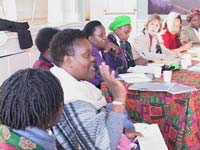
Eight Ugandan women met with the California Women’s Agenda at the Oakland YWCA to discuss issues of economic justice and development.
In January 2001, eight Ugandan women, all leaders in local and regional councils — including one member of the Ugandan Parliament, came to California to meet women leaders who participate in the California Women’s Agenda. From Napa to San Diego, the Ugandan delegation met in small groups to converse and dialogue with over 600 Californians.
This web archive presents transcriptions and video derived photographic images of their discussions.
Click here to scroll down to the story of how Ugandan women formed Action for Development
and here to the story of how Forum for women democracy was started.
January 18, 2001
Uganda women arrive in San Francisco
Greetings from Aileen C. Hernandez, Chair. California Women’s Agenda (CAWA)
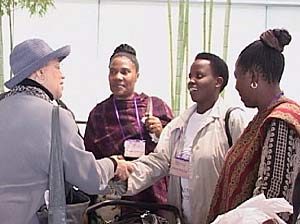
Marilyn Fowler greets young Uganda lawyer.
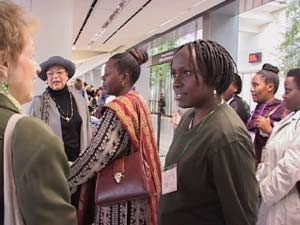
January 20, 2001
Mayor Willie L. Brown Jr. declares Uganda Women’s Day in San Francisco.
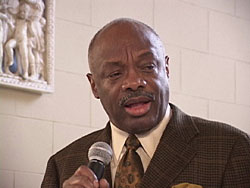
San Francisco is a city that has an incredible intellectual curiosity about itself and about everybody on this planet. And invariably any effort that is being made almost any other place in the world — culturally speaking or economically speaking — you will find a unit of that here in San Francisco.
And I too was a little perplexed when I saw that this was a San Francisco — Uganda tea, at the Japanese counsel (laughter). I was absolutely certain that somebody in my office had made an error. But I matched the address. And knowing that this is one of the great houses existing in all of San Francisco, and every opportunity I get to come here, I come to look. (laughter) I decided that somebody in WIN had had the same experience, and was extraordinarily persuasive in having you open the door. Now I find out that you have an interest beyond WIN and your government has an interest in Uganda, and that is very delightful.
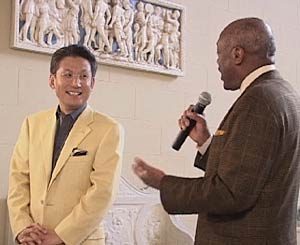
We in San Francisco have been about the empowerment of women more years than it has been politically correct to do so. At one time our city was, from a standpoint of power, politically controlled by women. You had Diane Feinstein who was mayor of this city, and the majority of the members of the board of supervisors were women. It was an amazing phenomenon. And it was not like this was the year of the woman, or any of that stuff, it was just San Francisco being San Francisco.
Sometimes we get a little off kilter, where there is only one woman on the board of supervisors currently, but we will correct that fairly soon, women are now aroused sufficiently.
… And being sophisticated in the globe, this city is also sophisticated in the world of technology. This business of making sure that the communications systems, and the opportunity to exchange every bit of information with other people, is of paramount interest. And the Women’s International Network (WIN) is absolutely committed in that direction.
… We in San Francisco will make this Uganda Women’s Day in San Francisco (approval). Acknowledging the commitment that WIN and the other organizations involved have made to bridge the relationship and the gap and the communications existing between women in Uganda, women in San Francisco and women throughout the world. The world can only benefit from that level of communication because invariably it leads to peace, it leads to the removal of poverty, it leads to great understanding, and clearly it leads to economic development and enhancement for all who are involved.
Japanese Consul-General, Nobuaki Tanaka welcomes women from Uganda and envisions partnerships in the future among Japanese, Ugandan and U.S. women
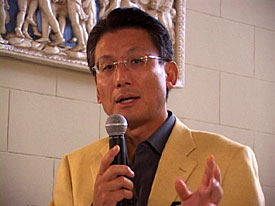
We have interest in Africa. Japan is either the No. 1 or No. 2 donor in all the African countries. And we held conferences on African development in 1993 and 1998 and then in a couple of years time, Tokyo International Conference on African Development. We are very serious in the problems of that continent because 40% of that population is still living under $1 per day. It is not tolerable in this time of prosperity. And we are determined to really do something about that.
Secondly, we are very much interested in the triangular cooperation. Not only Japan doing this or that, but also we want to do this with the United States. We want to do this with African people. This is an idea of trying cooperation — we call it common agenda or global partnership between United States and Japan. If the U.S. and Japan worked together we could do a lot of things. Very much so in Africa.
When Ms. Fowler brought to me the project of Ugandan exchanges, I was elated because this is one of the ideal projects that the Japanese government may be able to do — to fund — in the future. And we are working on that, so please talk about that later with Ms. Fowler. How to enlist Japanese cooperation into that.
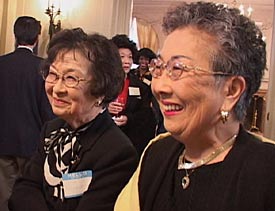
Yo Hironaka and Daisy Satoda
Thirdly, I am very much interested in the woman empowerment. Personally, I was the assistant manager general for UNESCO in Paris, for three years, and we recruited more women than any other time in UNESCO history.
So I hope that this is a start only. I hope that this triangular relationship will get more broad in the future.
Solome Mukisa accepts Proclamation from Mayor Willie L. Brown Jr
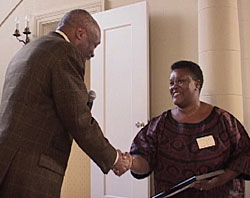
We are really humbled by the type of reception we have received in San Francisco. We thank you so much for your big hearts. And I must make this comment. That we in Uganda know that the Japanese are very hard working people. Almost all the cars we drive, I think that 95% of our cars are from Japan. (laughter)
I must say too, that many Ugandans have gone to Japan to do odd jobs to survive. And many who come back have said that the reception has not been bad, and that they have improved their life style while they were in Japan.
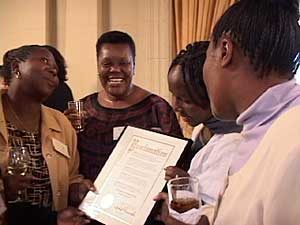
WIN has given this group a very grand opportunity. Some of us are moving out of Africa for the first time. And we do promise that we are going to strengthen the relationship between Uganda and San Francisco through WIN.
January 21, 2001
Community Welcome at the The San Francisco Women’s Building: mural exterior
Issues for Young Women
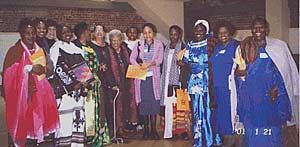
This dialogue took place at the Woman’s Building in San Francisco.
We began with poems and songs.
poem by Lydia Rwakishaya
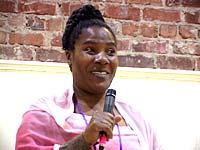
Oh African woman
You carry the fetus in your womb.
You face the child labor pains.
You spend sleepless nights
You nurse, and look after children.
You are a mother to the nation.
African woman
With breasts dangling
Child on your back
Firewood on your head
A tub of water for the family
And a tractor in the farm.
African woman
You till the soil and carry food home.
You weed the plants and feed fire.
You harvest the yields and thresh the grain.
You feed the family and the nation.
Woman, you are a beast of burden.
African woman, you are the bread earner.
You are the nurse at home.
You control human kind.
You are a nation’s life and hope.
Oh African woman.
African woman,
When will you ever be liberated?
When will your dream be fulfilled?
A dream of being free from poverty,
Free from illiteracy,
Free from economic hardships,
Free from political manipulation,
Free from cultural malpractices,
Free from domestic violence,
Free from human servitude,
Free, free, free.
A woman’s dream is
A woman who can have choice in life,
And have a better income
And have equal employment opportunities,
And have better education.
A woman
Socially, Politically and economically empowered
And emancipated.
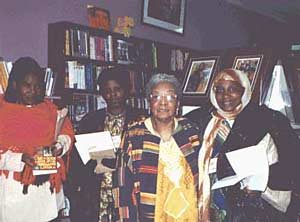
Dr. Raye Richardson (founder, Marcus Books) : We would like to have an interactive discussion on the problems that face young girls in our respective cultures.
keeping traditions and nurturing development
Dr. Richardson: How much of the past do you want to wipe away and how much of what is traditional do you want to keep and bring along into the future?
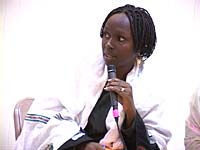
Lydia Bakaki: Not everything that represents Ugandan woman is detestable. It is not as if we want to shed off everything and begin all over. But there are oppressive tendencies. Which affect, actually, the whole country. They end up being developmental issues, not just gender issues. So we want to be selective.
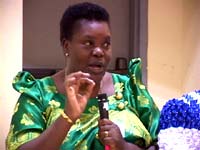
Solome Mukisa: Our constitution is very clear on that. It states very clearly that all traditional practices and policies that are oppressive or are against women should be abolished. So that is the guidance. We do not want to keep our traditions which oppress us. We do want to keep our traditions which are developmental. Anything that is discriminative, laws and traditions that oppress women – we must fight.
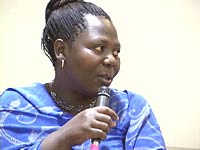
Jolly Mugisha: The way we are doing it, we are not really overturning the tables. We want something that is happening gradually. We train people. We talk to the people. We advise them on gender issues. You know, actually, change cannot be done overnight. But we are moving, not just standing there.
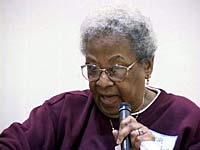
Dr. Raye Richardson: My mother died when she wa 28 years old. She left 5 children ranging from 18 months to 12 years old. My father reared us. And one day I think all at once he saw that I had developed into young womanhood. And he panicked. I was coming home from school accompanied by all the young people in my neighborhood. We always came together and left together, picking up each other down the street and from adjoining streets. The reason for that was, to get to that high school we had to walk through hostile territory. And many times we had to fight our way, either to school or home.
And this particular day, all the others had left to go to their home, which left me with two young men who lived at the end of the block. I am sure we were probably slapping at each other like young people do. And my father was out in front and he saw this. And so he gave me a whipping. And I did not understand why I was being whipped. And neither did my sister. And while whipping us, he used the expression, “Like a vice in heat.” And my sister came to me after he had left and said, “Hey, girl, what is a vice?”
“I don’t know.”
One of the things I did not know was that there were three girls, classmates of mine, who had died suddenly. And nobody told us why they died. And I found out much, much later that they had died of botched abortions. And that was one of the reasons that my father panicked when he saw that I had reached a certain age. We discussed it later, and I forgave him. But I was bitter about that whipping for a long time.
And I would like to ask you, at what age do the rules change for girls, where appropriate behavior is no longer accepted? At what time does a young girl become this person who can now have a baby?
At what age do the rules change for girls
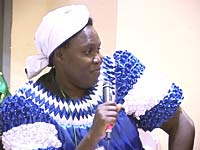
Betty Aol Ocan : I think that is 18 years and above. In the primary schools we have sex education so that at an early age they know about themselves and they know what happens. Because of the AIDS, you know, a lot has to be done about sex education. Before, it was not like that, but now it is something which is very common.
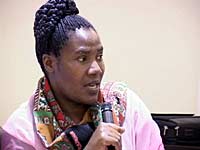
Lydia Rwakishaya: We are having reproductive health programs in schools. The tragedy of AIDS has pushed us to make our girls aware – not only girls but also boys. But also, when they get early pregnancies, they have to drop out of school when they are very young. Sometimes if they are lucky, they get married. But sometimes they just lie with children, and sometimes they die.
Dr. Richardson describes situations with US political leaders who have been in the news because of their extramarital affairs or illegitimate children. And asks what the Ugandan woman think should be said to young girls about how the world is.
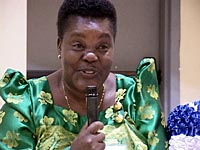
Solome Mukisa: Our situation in Uganda is very different from here. Our society is highly polygamous. I know that many groups in Uganda are getting out of it. But at least 50% of our society is highly polygamous. So if a situation came up like the mayor’s situation, it is not anything to worry about. It is not anything to even talk about, it is not an issue. We had a minister who married his wife in church. Then he went for a second wife, and he even put it in the newspaper. His first wife saw it for the first time in the newspaper, and she faints. But it was like, “Well, he needed a second wife.” For us, the situation like with your president, it is not an issue. The man wanted a girl, he had the girl, and that is it. Well, that is IT. There is no noise about it. It becomes just a personal issue. If you are from that part of society that is not polygamous, you talk about it. But , generally, forget it. There is no problem.
In my grandmother’s generation, they always involved the first wife in the marriage of the second wife. Even in the rural areas now, if you have grown and you do not think you can meet your husband’s sexual demands, you can go to your clan and find a young girl to marry your husband. She would play that role. But that is very different now.
Today, if my husband, for example, wanted to marry, it would be war!” (laughter) I can’t take it! I cannot take it. It is war. It just cannot happen. (applause) But, if it happened, I would not go to my mother to cry. Because she would probably say, “What is the problem?” He wants a second life, that is his problem. If I go to his parents and say there is a problem because he wants a second wife, they would say, “So what is your problem?” “Does he not buy you food? Does he not come to your bed? Does he not see you? What is your problem?”
As generations change, we cannot take it. I cannot take it. And I know my daughter cannot take it. But my mother and the others, they take it very easily. And even contribute in bringing a second wife.
Dr. Richardson. Where there are options, people take them. And when you can work outside the home and earn a living, then you are not totally dependent on a man. It makes a whole lot of difference doesn’t it?
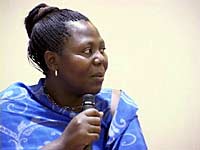
Jolly Mugisha: I want to say that when Solome was saying she cannot take it, she cannot stop it. We just cannot stop the men from getting second wives. What we are advocating for every woman in Uganda is that she be able to sustain herself, so that when the woman becomes bitter, she can go and make a living on her own.
Betty Aol Ocan. If you are Moslem, your husband can have up to four wives. If you are cultural, he can have as many wives as he needs. But if you are Christian, and your husband gets another wife, you can just divorce. Constitutionally, there is protection for women. And now with AIDS, women feel very strongly about their husbands bringing in other women.
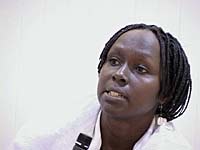
Lydia Bakaki: The law in Uganda recognizes four types of marriages. The church marriage, which is similar to the civil marriage. The customary marriage and the Moslem marriage. If there is a cultural marriage, you can have as many wives as possible, but you cannot mix a Christian marriage with a cultural marriage, though this is done a lot. But most women cannot say anything, they cannot challenge it because they do not want to lose their husband, entirely. The second wife is kind of recognized in society, but legally she is not acceptable.
How young women’s roles change
Dr. Raye Richardson: What about virginity. Is it possible for a girl to decide whether she is going to have sex with a man or not.
Betty Aol Ocan: In our education in our schools, we are telling young people that they need to be in control of their bodies. And that they need to support each other. But the reality these days is that when a girl says “No,” she means it. And these boys, with the Straight Talk, now they know that when a girl says no, it is no.
Women from the Audience begin to participate:
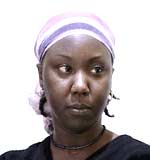
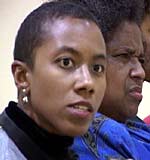
I am from Kenya and things are definitely changing. We are encouraged now to get an education and to be able to support ourselves. But my parents are putting a lot of pressure on me now to get married and have children, now that I have become educated and have a job. But I understand that who I am is not determined by a man, I have my own sense of who I am. It is a battle that we struggle with every day.
African American women have known for several generations that we have to be self sufficient. Because our men were decimated. They did not have the opportunities that we have had in the past few generations. We came to understand that we were going to have to take care of any children that we brought into this world. That we had to take care of ourselves first. That we would always have that responsibility. I was brought up to be self-sustaining and independent. That is an old fashioned term, but that is part of who I was.
Dr. Richardson: Education allows African American women a freedom and independence from men who were not in a position to take care of them anyway. And I hear that tonight, that education, first and foremost is a liberating force. That liberates you from this total dependence on men.
Although there was this independence, there was also an emotional hunger to be with men, because there had been so much separation from men. And because African American men had been decimated. And in that sense it created a different kind of dependency.
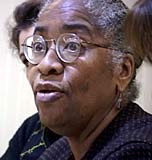
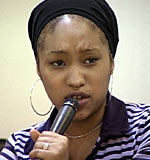
Because I am a single women, at times it does feel like I need a man in my life. But finding that right man to be with me is hard. And that brings on that other problem of white men being in my life. And dating white men. Once you enter your career, who is out there for you?
For myself and the women I know, the more educated you are as a black woman, it seems that black men are intimidated by you. They find it difficult to be with a black woman. I haven’t figured out why.
Solome Mukisa: Since the affirmative action in Uganda, and Ugandan women got into politics and became powerful, they are making decisions, they have the money and are doing so well, more than half of them have lost their marriages.
(Or their men have second wives and third wives now — from audience)
Solome Mukisa: Yes. Those who cannot take it have divorced. Those who can take it have stayed, but they are not happy. But it is much better that you have your own ability to survive, than being in a marriage and depending on somebody. It is very typical of African men and of Ugandan men. Many of our women are suffering and our girls. But we have sensitized them to choose between the two. Not have it and suffer, or have the money and the power, but not have the man.
Economic independence
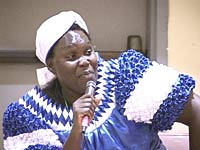
Betty Aol Ocan : At the moment, some of the men are getting to understand that economically, we have come in to be breadwinners. Not only men. But they fear educated women. They are more difficult to deal with. They fear them. And the more educated you are, the narrower is your market, in society. Very few men actually go for you. Most of them fear you, that you are a difficult person.
Jolly Mugisha: It is like a power struggle. When you are economically independent, it means to men you are difficult to control. You can do what you want, anytime you want to do it. No man is willing to have a woman who does not depend on him. When you depend on somebody, then you are easy to control. When I was young, I remember our parents told us, when you go to Makerere (the oldest university in our country) that the women from Makerere are not supposed to be married. And I want to tell you that many of my age mates are not married. Either you go to Makerere or you stop and get a man. It is just a competition for power. And many of our colleagues who are in high offices are suffering. A husband cannot accept someone who can go where she wants or whenever she is called upon.
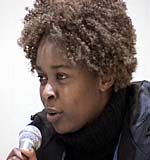
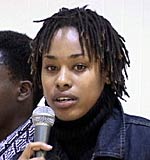
There is not enough self-love being taught with this generation. Too many girls I know start their day wanting the attention. Who just begin their whole day with who is going to look at them and how they are going to be attractive. There is not any going on of you being happy with you in the morning. And you being happy with you at the end of the day. It is not wrong to yearn or to long, but you need to be able to fall back on yourself and know that you love yourself. This is what you need to be doing with your ladies, and what we can start teaching each other.
For those of us from Kenya, we find that our Kenyan guy friends here, they find us interesting for right now, but when we go back home, we have to unlearn all that we have learned when we were here. Here they find us nice and will date us, but when we go back home they want the stereotypical woman who is in the kitchen and barefoot and pregnant. Here there are women who will support us and who have overcome those problems, but there it is very difficult.
One of the first things that happened to me when I came here was, because when you speak they hear you are not from here, and a man will say, “Oh, you have a beautiful accent,” So here there is that “exotic” attraction. So a lot of men will approach me just because of that, and because of where I am from. Then once they have learned everything they need to learn about Africa, and all the stereotypical questions that you can ask, and then it dies and that is it. So, it is … interesting. You have to have an extra layer of skin, just to know that all the men who are approaching you are not approaching you because of you. A lot of the times it is just because of where you are from. You are, I guess, different, you know.
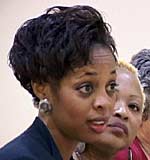
WIN – CAWA volunteer. Being from the south, and having been raised in Mississippi, men automatically assume that I can cook, (now that I can do, I can cook), but they assume you can cook, you are going to be a good wife, you are going to have a lot of babies. It is a regional thing, it just depends on where you are born. They automatically assume you are a southern belle, you are a good woman, you won’t cheat, you won’t do nothing. You will not give him a hard time. You will be what ever.
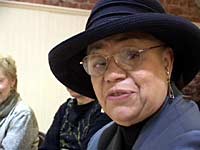
Aileen Hernandez: Under economics, when you come to the point of having something that is scarce in number, you inflate it’s value. And I think that is exactly what we have done with men. They are scarce in number for a number of reasons in this society, we have inflated their value way beyond our own. So we do not have enough self love to believe that we can survive on our own, and we don’t ask anything of the men in our lives, because they are that scarce value. So we permit a lot of things we should not be permitting, and we and they are mis-educated. What we have been doing in the women’s movement for so many years is giving each other support and education. We have to turn now to some education of the males in society. We certainly overvalue what they are giving to us in this society, and we are permitting them to do it.
poem: WOMAN by Jolly Kyomugasho Mugisha
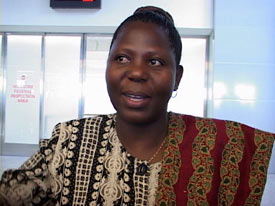
Only woman
can understand
what cannot be expressed.
Only woman
can express
what can’t be said.
Only woman
will wrap her arms around you,
and feel
what can’t be touched.
Only woman
can touch
what can’t be seen.
And, with her heart’s
gentle strength, hold
what can’t be reached.
And reach
what can only be imagined.
It is only woman
who can silently translate
what can never be translated.
She only
can sit patiently —
ten o’clock, eleven,
midnight, three a.m. —
Waiting,
waiting for a drunken spouse
who may even come
to infect her
with the deadly AIDS.
It is only she
that can withstand
domestic violence,
insults and slaps.
Slowly wiping
a tear
from her eyes.
Woman, the mother,
daughter, sister,
auntie or grandmother.
White woman,
yellow and colored woman,
black woman.
It is only she that builds a family, the basis of a nation.
It is only a WOMAN
who can humbly
hang on and on
For the development
of humankind.
Jolly Kyomugasho Mugisha is a poet as well as woman leader and governmental administrator
widowed, since 1991, two sons and a daughter. Three adopted daughters
Bachelor of Arts Degree, Political Science & Solciology, Makerere University
Certificate Training: Computers
Employment: Gender Specialist in Charge, Mbarara District, since 1992
Member of the Rotary Club of Mbarara West, President elect for 2001-2002
Chairperson Mbarara District Women’s Development Association, an NGO based in Mbarara that has worked for the development of women since 1989, the close associate of ACFODE.
Member of Uganda Women’s Effort to Save Orphans. I work as their technical administrator at the district level to raise funds both locally and internationally.
1994, Trained in laws of domestic relations. Have since acted as a para-legal/community legal advisor in Mbarara.
Through counseling and mediation, I have been able to assist women who suffer domestic violence.
Other Activities
— Promoted the welfare of orphaned children in Mbarara through sensitizing communities to take up orphaned children and provide foster care.
— Through counseling, I assist young widows to face up to the new everlasting challenges of widowhood which include homelessness, widow intolerance, poverty and others.
Political Activities
1994 — Civic education for all women to participate in the decentralization of Uganda.
contested C.A. election — Parliament (ran for national office)
Q & A about Uganda: Black Women Stirring the Waters
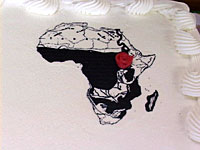
This is the cake served at a luncheon/discussion
sponsored by Black Women Stirring the Waters.
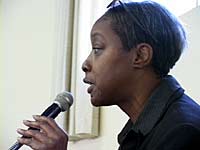
Before answering questions, the Ugandan delegation will introduce themselves.
Solome Mukisa: I am involved in encouraging the women of Uganda to be involved in the politics of the country. To be involved in decision making in the policies of the country. I am a mother of seven, and I was for many years a guerrilla fighter against a killer government in my country. I am from Eastern Uganda, as is Lydia Bakaki.
Betty Aol Ocan: From northern Uganda. I am a national trainer for Forum for Women in Democracy. I am Secretary for Health, Environment and Child Welfare in my District. I also have seven children.
Jolly Mugisha: I am from western Uganda. I am involved in calling women from all walks of life to participate in development programs.
Lydia Bakaki: I work for Action for Development as a member and as an employee. As a member, I spearhead advocacy and lobbying for law reform and policy reform. As an employee, I do civic education and monitoring of elections. So I stir up women to be involved in democracy and good governance.
Beth Mwebaze: I am a teacher by profession and I work with Forum for Women in Democracy.
Regina Sanyu: From the Southwestern part of Uganda at the border of Rowanda and Zaire. I am a mother of six children and an agriculturalist in sustainable organic farming. I have been elected as a District level councilor.
Lydia Rwakishaya: From the Southwestern part of Uganda, and I am a local councilor. I am a teacher by profession, a mother of four, and my role in the community is to sensitize and mobilize women, so that they are able to know their roles as far as leadership is concerned. I am happy to be here today, and more exactly, to be with people who are exactly like the people I meet at home. I must say that it is like we are in Uganda. It is like home.
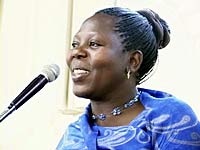
Jolly Mugisha: And I want to say we are very quick learners from Uganda. We have just been here in the United States 3 days and we already have learned English. ( laughter) In Uganda, we speak English. It is our official language. This is because we were colonized by Britain. Because we come from different parts of Uganda, we cannot understand each other unless we communicate in English.
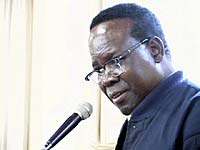
Fr. Bud Arnyo: We were colonized by the British for over 100 years. And English was the language of training, the language of government, and the language of schools. So we do not come into this country to learn English quickly. The British left the legacy of English in Africa just like they left the legacy of English here in the United States.
How do the men receive you?
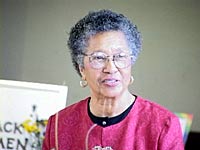
Solome Mukisa: In Uganda, for many years women have been looked at as people who will remain in the kitchen. The common saying is that the place of a woman is the kitchen. Ninety percent of our population is an agricultural population. The women stay in rural areas, doing the agriculture. So the woman’s part is morning to evening, making sure there is food for the family, making sure the food is cooked, making sure that the home is clean, assuring that if anybody is sick, they are looked after, and all this is done by physical power. We do not have machines that would help in the home.
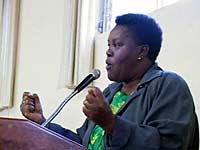
You would dig physically with a little hoe; you will come and look for firewood. But for the last 15 years and the introduction of affirmative action, it has enabled many women to come into politics. To get involved in decision making positions. So a good percentage of women are now coming out of their traditional role of being a woman in the kitchen, to sitting with the men and making the policies. To sitting with the men and deciding on very important issues in the country.
Now this is something that is new to many of our men. And I can assure you that many are shocked. (laughter) They are shocked because for many years he has seen the woman down there. “Do as I do,” you know? And what is so exciting is that the few women who are coming up are doing such a wonderful job, that that is trouble.
It is really trouble. And so when we say, I am going to work, I am having the money, I can do this job, we have resistance. There is no question about it.
But we are doing it carefully. We do not want to fight the men. The women’s movement is young within our country. And we feel that if we break their backs, they may break out legs. And so we are moving carefully and showing that a woman can do what a man can do, and in many cases even better. So that is the situation (applause) And right now I am very busy campaigning in my district to go to the district parliament. Because I have the support of the community, I can assure you I will be there.
Is this special dress you are wearing? Or is this the way you dress all the time?
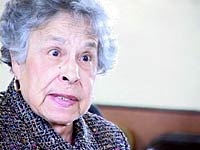
Jolly Mugisha: Uganda has a diversity of cultures. For those of you who do not know, Uganda is in East Africa. It is one of the East African countries and it is right at the equator. It has a population of 21 million people, or so. About 53 % are women. It is a very agricultural country. It is very fertile. It has a very good season. There are no winters. There are no deserts. We have very many ethnic backgrounds.
There are people called Bantu, they cover the largest part of Uganda in the north and east. These people extend as far east as Kenya. The people who live in central Uganda are called Baganda. Since long ago they have had a bark cloth. (Asks Solome to stand and demonstrate the way her garment is tied, after the manner of the bark cloth that is traditional in the eastern area she is from) In western Uganda where I come from, people were traditionally pastoralists. They had many cows, and before they could get cloth they were using skins. A woman would get two hides and drape them with on under the other, to cover the whole woman. When we got cloth, we also continued to drape in layers in the manner of hides. We try as much as possible to retain our culture for identity. We put on these dresses that reflect our culture for social functions like weddings or funerals.
The western countries now are eroding our culture. In Kampala women dress in the same way that you do here.
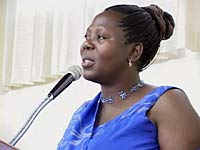
Lydia Bakaki: In Kampala, these traditional clothes are rare, but in villages, women do their work every single day in those types of clothes. They wake up dressed like that. They go to dig in that dress. They cook in the dress; they are really like that the whole day.
What are the schooling requirements for Uganda, and what are the school graduates aspiring to do with their education?
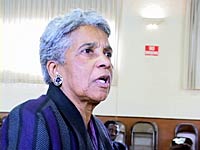
Lydia Rwakishaya: I am going to talk about the educational system in Uganda. We are structured as I am going to tell you.
We have a pre-primary level, which is nursery. Children go there when they are 4, 5 and sometimes 6. From pre-primary level we go into primary level. And this primary level is 7 years. They should go when they are 6, but now that we have Universal Primary Education and we want all children to go to school, some children are not starting until 7, 8, and 9 up to even 12 years old. If they have never started, even if they are 14, then they are allowed to start.
After 7 years, we sit for an examination, where we get a certificate. That is the primary leaving certificate, after 7 years. And now we jump on across to secondary education. We have two levels of secondary education. The lower level is called “ordinary,” and we go in there for four years. Here we learn language, writing, chemistry, etc. After that we sit for examination and get a certificate.
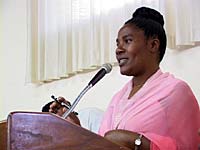
After that we go for another secondary education that is “advanced.” We go in for 2 years. And in that system we will have also some vocational secondary schools. We now learn skills: tailoring, carpentry, brick making, and all kinds of things that will give one a skill.
And there is also colleges, like teacher training colleges, polytechnics like schools of hygiene. From these schools we get diplomas. You will be a professional. And you can continue after this and get the masters degrees the Ph.D.s. You can continue.
When you have reached your highest education, we start searching for jobs. Either from government or private practitioners. That is how our education system is.
My colleagues have asked me to talk about UPE, which is now a government policy in Uganda. Now all the children must be school going children. They all must be in school. Initially, you would send children to school when you had school fees. Sometimes we would send children to school when we were a bit enlightened, when we know what we want. But now the government is saying, every child of Uganda, whether there is money or not, that child must go to school. (applause)
The government is contributing money to this program. And I must say that the program is taking root, because most of our children are now in school. It is called Universal Primary Education and it is what we are all agitating for.
What are the economic resources in Uganda and who controls those resources?
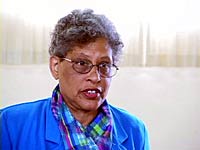
Lydia Bakaki: Before colonialism we had many resources, but we did not know what we have. Land was owned communally. So when the British and others came, they knew exactly what was where. And everything became government owned, because there was no particular owner.
Back where I come from, people laugh at us because when we look at our very nice trees, we say, “They grew by themselves. So you are free to take them if you want.”
Now when Amin came, he ruled by decrees. And one day he said that land belongs to the government. So if the government gives you land, you can evict someone who is living on the land.
But after Amin, there has been an era of privatization. But only a few families can afford to buy resources in the private sector. And it becomes popular, if you can leave the country, to go abroad for work because there is little work in Uganda and no job security. Even when you have completed university, you may find that you cannot find a job in Uganda.
Now back to land. Even communal clan land, now can be turned into free hold land. Which means you can go and register it in your name. And because we are a patriarchal society, the men are the custodians. Which means they are becoming owners. And the women do not have land. And even their right to access has been affected. It was like a subtle thing. It started in 1900.
What are health issues, the issues for children — especially AIDS?
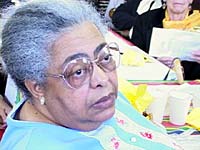
Betty: We have primary health where we do our best to prevent illnesses among children. We have good policies and we get support from organizations like UNICEF. We have immunizations for all of the diseases that have a vaccine. We try our best before a child reaches the age of 5. For three years we have been vaccinating against polio. And I think that very soon we will have no cases of polio in Uganda for children. (applause)
As we all know, children are very vulnerable. We have problems with curative diseases like malaria. We lose a good number of our children out of malaria. We were surprised here when we went to bed, no mosquitoes. But in Uganda, we still have mosquitoes. Even in an expensive hotel you will still see mosquitoes.
The part of Uganda where I come from, we lose a good number of our children out of malaria and diarrhea. We have respiratory tract infection, which kills many of our children.
We have good policy. We are fighting to protect our children. But still I must say the death rate is very high for children.
Right now we have AIDS in Uganda. AIDS. It is a big problem and it effects also our children very much. We promote condom use so that someone who is HIV positive will not produce children, who, at the end of it all, will suffer and die. But in a rural setting it is still a problem. People do not go with it very easily.
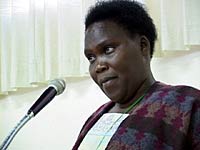
Another impact of AIDS on children is that many children are left orphans. And these orphans, because of lack of guidance, they sometimes end up getting AIDS, because of lack of protection.
In our hospitals we have a nutrition unit. And most of the children who are taken to this nutrition unit are actually HIV positive.
So we need to make people aware. So that once they become aware they are HIV positive, they begin to live positively, and not produce more children, who will suffer and die.
I want to talk about war. I come from the northern part of Uganda, and that has actually been the worse hit. We have been in war now for 15 years. Many of our children have seen no peace. And many of our people live in internally displaced camps. And children are more vulnerable there. Food is a problem. Sanitation is a problem, and there are widespread diseases. We have some camps with 40,000 people. Water is a problem. It is so difficult, and they have lived in those camps for long. It is also why people have to migrate. You try to go back in the village, and you are disturbed by the rebels. So you come back to the camp, but life is impossible. So the problems are cultural, social, economic and even political. These rebels are Ugandans that have fled into Sudan. They just hit and run. Hit and run.
In the camps the children are losing their moral value. We are afraid that unless there are some programs for these children, that they will not behave well.
January 22, 2001
Dialogue on Women’s Health Issues
with CAWA Health Task Force, facilitated by Roma Guy,
Chair of the San Francisco City Health Commission
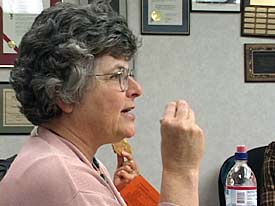
Roma Guy: Our broad definition, for us at the California Women’s Agenda, is even to change what came out of the Beijing Conference, because the Beijing Conference, we feel, focused still too much on disease as health, and did not focus on what we consider health which is a person’s state, a family’s state of well being. What constructs in a person’s life, a family’s life, a nation’s life as well being — and that is health? So the environment is an important issue. Not just that you have a cut on your finger or primary health care. So that is our perspective. So we look forward to learning what the women of Uganda work on as health.
What we chose to focus on was to bring universal health care to all the women and children of California. So that no matter what your health issue is, there is a service there for you. No matter what your color is, no matter how long you have been in California, no matter your age, etc. Because in the United States, there is not as much money in the health care arena as there needs to be.
We tend to look at health care as medicine, so some of us are interested in holistic health, alternative health care, housing as a health issue, violence against women as a health issue, and things like that.
So that is the context in which our health issues are focused.
Participants: Dialogue on Women’s Health Issues
Lydia Bakaki
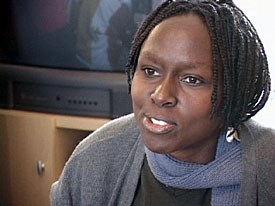
Lawyer, Lobbyist for Law and Policy Reform and a Trainer of Women Politicians
Chairperson of the legal department of Action for Development (ACFODE)
Chairperson, Uganda Land Alliance ula@infocom.co.ug (ULA)
Gender Monitor, representing women, National Monitoring Group (NEM)
contact: acfode@ starcom.co.ug
Solome Mukisa
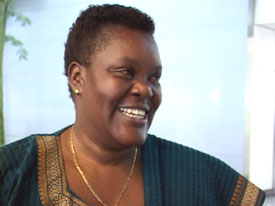
Woman Political Activist
Through Training, Advocacy and Networking
at National and Local Government Level
Executive Committee Member of Forum for Women in Democracy (FOWODE)
Director for Women’s Affairs
in the Nation’s President’s Office, 1989-96
National Director of Uganda Community
Based Organization for Child Welfare, 1993-96 (UCOBAC)
Women’s Participation in the Politics of Uganda
Vulnerable Children in Uganda
Regina Sanyu
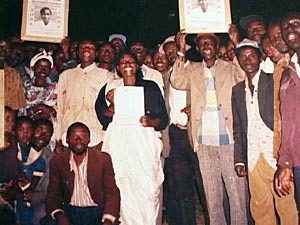
Experience as organic farmer and trainer
Benefits of organic farming
Family life education program
Literacy education
Before you go for a seat for a local council you have to draw your manifesto and what you want is listed with your photograph. In my manifesto I had community mobilization for women, poverty and education, literacy education, family life education, home sanitation, nutrition, how to avoid unwanted pregnancy, how to get a pregnancy, modernization of agriculture and organic sustainable methods of farming.
You need to have people who are your supporters and who will be your agents to help you tell people what you are doing, what you will do for them, because you do not reach each person, so your agents reach where you cannot go.
You should not promise what you would not do. I did not want to tell lies, because I knew that it would not pay. You need to be a trust worthy person, because people would come back to you and say, “What did you tell us.” Empty promises were not my target because the things that I do share my skills with the women and the men also.
Lydia Rwakishaya
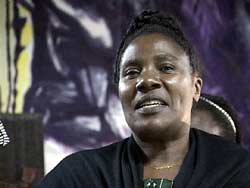
District Councilor
Teacher of English Language and Literature in Secondary School
Woman Leader and Chair for Bushenyi Women in Development Association (BWIDA)
Life member and volunteer for Family Planning Association of Uganda
National Delegate representing women from the Southwestern Part of Uganda for Family Planning Association of Uganda
Bushenyi Women in Development: A local organization
Volunteering for Family Planning
contact: Bushenyi District
P.O. Box 187
Bushenyi, Uganda
Jolly Kyomugasho Mugisha
Beth Juna Mwebaze

mother of two — tribe: Muyankole — Residence: Mbarara
Occupation: teacher — Mbarara Junior Day and Boarding School
Graduate of Twentanga Teachers’ College
Chairperson, Wakame Binga Obworo (a CBO)
Chairperson, Spaga
Committee Member, Mothers Union St. James Cathedral, Ruharo
Member and Trainer, Uganda National Farmers Association
General Secretary Women’s Council II, Ruharo
Councillor LCIV, Mbarara Municipality
Member, Finance Committee, Mbarara Municipal Council
FOWODE member and trainer
Adult Literacy Instructor, Ruharo Ward
Betty Aol Ocan — Standing for Parliament, Gulu District
Connecting Gulu Women to Information, Resources and Training
Protecting Children from Abduction and Child Abuse
Follow up of child offenders and their families
Preventing street children through Orphans’ Care
Gender sensitivity training for the community
Functional literacy training for women
| District Councilor: Secretary for Health, Child Welfare and Environmental Protection and in Charge of Women’s Issues in Gulu District Local Council National Trainer with Forum for Women in Democracy Chairperson of Laroo and Pece Women’s Association Chariperson of Community Welfare Association-Gulu A member of the Board of Governors in Gulu City Secondary School Chair of Finance Committee of St. Mauritz Church-Gulu |
Carolyn Marx, Vice President of the Commission on the Status of Women,
Dr. Marcella Ogbu, Director of Maxine Hall Health Center, originally from Nigeria.
Norma Hotaling, I am the Director and Founder of an organization called S.A.G.E. which is Standing Against Global Exploitation. We work internationally on behalf of girls and women who have been recruited into prostitution, trafficed into prostitution, who have childhood sexual abuse issues, molestation, rape, domestic violence. I have worked quite a bit with women all over the world, some of my first experiences were in China at the 10th U.N. Conference on Women.
I was formerly a prostitute. A lot of the issues we work with other women on, are my issues too. Child prostitution — me. Drug use — for 21 years, heroin. I was homeless, rape, domestic violence — all that I experienced. I created the agency that I created, because I never got the help that I needed.
I am Helen Rodriques Trias, I am a retired pediatrician, but I am also an activist on women’s health, women’s rights and now primarily what I am doing is working on women’s international health programs in the Santa Cruz Leadership Training program — under the auspusis of Hewlett-Packard and Gates Foundations. It is bringing people from various countries including Ethiopia, Pakistan, Philippines and Nigeria for the English speaking group. For the Spanish speaking group we are bringing people from Nicaragua, Honduras, El Salvador, Chiapas, Yuccatan and Guatemala. They come for an intensive three week training and then there is a commitment on the part of the program to really help people network. To advance the family planning, reproductive health agenda in their region.
I am Sheila Delaney and I am a Santa Cruz county community activist and was on the women’s commission for 10 years. Our current project at the women’s commission is to get Santa Cruz to not only recognize, but also to enforce and incorporate all aspects of the convention on the elimination of all forms of discrimination against women, as San Francisco has. (CEDAW) That is our project, long term, for the next few years.
Joan Goddard, from San Jose area, volunteer with Forward USA
Onnie Yand(?) a wholistic nurse in private practice. My focus is on menstruation and women’s spirituality.
Yvette Hockburg, and I have lived in West Africa since 1998. I’ve been working on education, health care, agriculture, income generation, literacy training programs, including peer-counseling program for AIDS and family planning. Human rights issues. Women’s rights, gender , refugees. I work with Amnesty International. We were working on getting a women’s commission going just before I left Senegal, and it has started since I have been gone.
Mimi (Meserak) Ramsey from Ethiopia. I started an organization – Forward USA in 1996 – working on an African women’s health issue. That is what my interest is, and my background is nursing, too. When I heard the Ugandan women are coming, I said, it looks interesting, I have to go and get connected. My volunteer, she told me about it, and said, “We have to go.” And I said, “Yes, we have to go.” So we cancelled so many appointments today to be here with you. When African women come to another country, it means being exposed to another culture. We have our own culture, but it is good to be exposed to another culture.
Kimberly Terry, Director of Clinic Operations, for Planned Parenthood Golden Gate. My responsibilities include overseeing all 12 of our clinics. We have one at S.A.G.E., we just opened one at Good Sam, these are outreach clinics we operate one day a week. And then nine of our clinics operate on a daily basis with a variety of services.
Roma distributes copies of CAWA women’s health platform and violence task force platform for the state of California. Also distributes a map that shows where Uganda is in Africa.
Adele James, I am a program officer at the Women’s Foundation here in San Francisco. I am originally from Trinidad.
Descriptions of Health Care Systems: Uganda
Roma Guy: Perhaps we can begin by seeing how our sisters from Uganda see the health priorities in your country. And maybe what you want to ask and stir us to discuss.
Betty Ocan Aol: Basically, we still have a lot of problems with health, simply because there are still a lot of water and sanitation problems. If we get our way, especially with water problems, I am very sure the health situation in our country will improve a lot. There is a lot of focus on primary health. And then reproductive health. At least the government of Uganda, in collaboration with other NGOs, they are trying so much to improve year by year. Our resource envelope for health is good, especially primary health.
Our problem is curative. It is still a big problem.
Is what?
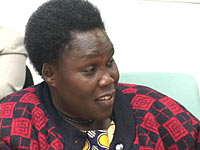
Curative – when we talk of malaria, when we talk of respiratory tract infection, diarrhea, those are curative.
We already have cost sharing. Poverty is still very big. So (paying for services by cost sharing) it is a big problem.
Child mortality rate – if you look at the northern part of Uganda, child mortality rate is still very high. Very high. Especially also for the mothers, especially during birth. It is highest in the country, that is for northern part.
It is still a big problem, but we are trying.
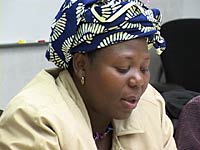
Jolly Mugisha: Uganda has come up with new plans for health care in the districts. Every district has got to have a hospital that is equipped with all the medical personnel and all the facilities. Those services now are going to be extended to the lower administrative level which is county, and every county is supposed to have a well equipped health center with a (surgery) theater, but this one is still in the pipeline.
Some counties already have those centers. Others are still being constructed. And the same program is going to move down even to sub-counties. Of course, these are promises from the leaders of the country. We don’t know if such services will extend even to lower levels. But it is a policy, and we hope it will be implemented.
Betty Ocan Aol: It is actually implemented in some districts. Most districts, but some counties. Like in a district you can find five counties. In the five, maybe two will already have this structure that is called the sub-district. That is health center 3. Then at parish level there is health center 2, and you might even have health center 1 which is under a big tree where you can have immunizations and other health services. That is health center 1 at village level. So there is village, parish, sub-county, county, then district.
Roma Guy: How many districts are there in Uganda.
Jolly Mugisha: Now there are 53. But some of those districts, they just broke off from the old districts, so they may not have these centers yet. We believe that when government stabilizes, then the centers will be build in those areas.
Maybe to add on to what has already been said. In most of these centers, health centers, we do not have all of the facilities we were talking about. For the past 5 years government has been trying to fight against polio. With UNICEF and Rotary International, they put up a program to immunize children. Massive immunization. Those immunizations take place at very low levels. What we can call a village now. In small villages, people go there and immunize the children. Those services we have. But for the more complicated services like treating heart disease, people have got to go out of the country to look for those services. Those would be the rich ones, or members of the government. But the majority of the people are dying even of Malaria. Even when we talk about having those services at lower levels. Because the hospitals are not equipped and they are far.
The district is far from the rural women. They do not have money for transport, and then they die.
Regina Sanyu asks about a book called, Where Women Don’t Have Doctors. From the Hesperian Foundation. There are things to do before you go to the hospital, because they are a far distance away from where she lives, if she thinks she has been infected. Moreover, she may not be having the money to go and pay there.
Discussion about whether home remedies such as vinegar douches are helpful to control sexually transmitted disease.
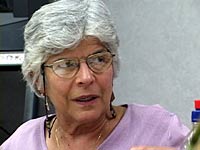
Helen Rodriques Trias: I do think that the prevention message is the most important one for women. And to men. Because anything that would give you a false security, like “I did the vinegar douche…” I am not too keen on recommending it.
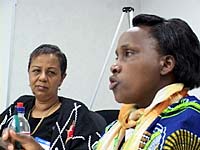
Regina Sanyu: You may not rely on it, but meanwhile if you do not have some money to take you to the hospital, you do the cleansing. While you get other ways. Maybe you go to an association of women and you borrow money. Meanwhile, you are nursing yourself.
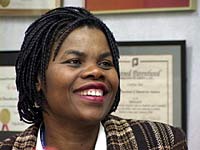
Dr. Marcella Ogbu, It is actually a very good book. It tells you to drink a lot of water until you get there.
Helen Rodriques Trias: There is some basis in actual fact. Such as the cranberry juice for urinary tract infections.
Regina Sanyu: We use it in organic farming practices. So I read it when I go into our center. When I read those paragraphs I copied them and went to tell my women. But they do not allow us to take it (the book) from there. So I would like to find it here and buy it.
. . .
Jolly Mugisha: Health services are open to everyone, but there is the problem of cost sharing. Because the majority of the people are poor and cannot afford that. You have to put some money in order to get services. When you go to a health center, they just ask you what your name is and that is all. Nobody cares about what it is you do.
Dr. Marcella Ogbu: So the cost share is also in the health center and in the village?
Lydia Bakaki: You have to line up for several hours. And the practitioner might not be there when you get your turn.
Dr. Marcella Ogbu: You had indicated that you had outreach services, do practitioners go to a home, or do patients come to an outreach post?
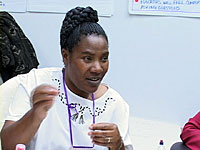
Lydia Rwakishaya: There are some outposts. Health workers go to that post.
Betty Ocan Aol: There are also community workers who go to communities for family planning, traditional birth attendance,
Do you pay for those?
Betty Ocan Aol: No those are voluntary, or sometimes you just give incentives.
Descriptions of Health Care Systems: San Francisco
Roma Guy: Dr. Ogbu is form Nigeria and she really is a leader in our community in the area of health and in primary health. I would like you to share how your center is structured, now that we have heard their structure. And where the contradictions are, in the same way.
Dr. Marcella Ogbu: San Francisco is divided into about 15 health centers. Public health centers. First we have what is called population health, and then we have two hospitals provided by the government, that does not include the different private hospitals. Or what we call clinic consortium, or what we call non-profit clinics. The department of public health provides services for almost everybody.
When I was listening to how your (vertical) structure is, I thought, wow, we should be so lucky. We don’t have it broken down to the district level and so on and so forth. In a way, in the last couple of years, I think the department of public health is coming around. In the past we used to have down at the bottom the curative care you were talking about. And then we had preventive care, this small at the top. So much money was being spent on people who were sick, instead of trying to prevent the illness.
Now, I guess the pyramid is changing, but not quite. Now we are trying to have prevention, hopefully, and we are trying to have primary care. And that is where I am. So we have about 15 of those primary care sites and each of them is located in different neighborhoods. And there is an attempt to provide services that reflect the neighborhood in which they are located.
So where I work is called Maxine Hall Health Center, and it is in a neighborhood that serves African American — blacks. Although that is changing, and it is a long story so — I do not want to bore you with it, but it is because of what we call gentrification — many blacks are getting out of our neighborhood.
(aside) Being forced out.
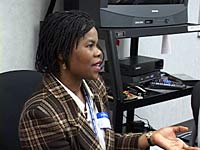
Because when I started working there 16 years ago, it was 70% African Americans, but today it is about 30%. So essentially the people now who are in my neighborhood are rich people. Yet, they are rich, but they cannot afford health care.
(question) Which neighborhood is it?
Western addition – Fillmore.
In my health center, 51% of the people who access the health care system do not have insurance. They work full time, or they work part time, sometimes you hear people call them the twilight zoner, that means they are too rich to be on public health, what we call Medical, and they are too poor to purchase insurance. So really the big thing we have is access and insurance coverage.
The center I work in we serve from (age) 0 to 100. We have one client who is actually 98. We provide comprehensive health care. Immunization is still very, very critical. It is one of the services we provide. We have what we call Women’s Clinic that provides a whole array of women’s services from birth control to essentially everything that impacts women. We have an HIV clinic that provides services to individuals with HIV. We have an STD clinic that provides services around sexually transmitted diseases. Then we have primary care services that are everything lumped together.
I think what I find very unique about our clinic is we have what is called drop in. The reason we created the drop in is that the population we serve is very poor, they are unable to keep appointments, so if you have an appointment two weeks from now, they probably do not remember. Or they have so many problems going on with their being homeless, or not having access to a lot of stuff they are dealing with. So they are dealing with so much, that an appointment at the health center is way way at the bottom of their priority list. So they come in when they are sick. So that is why we have the drop in, so that they just come in whenever they are sick.
People pay from $0 – $110 based on their income. In a way, most of the people who come, end up not paying. The tricky thing about it, really, which brings up the whole thing about managed care, is the fact that if you can advocate for yourself, you can go through this system. But if you don’t know how to advocate for yourself, “Too bad.”
So people who can come in and say, “I am really, really poor, I cannot pay” — can probably go through. So when you are talking about women paying, I am thinking how most of the people (in my clinic) who pay, are women, and they are poor. Because they have this sense of respect. “I don’t want to tell them I don’t have money to pay for health care.” So they pay.
So it is a very interesting system. But a lot is being done for people who otherwise do not have access to health care. We are seeing lots of homeless people. Lots of HIV, but the biggest group now are mentally ill patients. Seven percent of the patients we see at my center have schizophrenia. That is about ten times the general population.
I am very proud of our health center, even though we do have problems. We have managed to look at health care as not just coming to see the doctor. So we have psycho-social, which includes mental health, psychologist, counselors, and all that. So one of the interesting things we are finding out is that if people come through primary care, to mental health, they actually feel better. They do not want to be called crazy. Once they are called crazy, they do not even access health care. When they come in and they realize something is happening, and they go to mental health and then back again to primary care, it is a very comprehensive model, and they fare better than going the other way.
We also have a substance abuse program. We are working with UC. UC is one of the hospitals, so we have a substance abuse counselor. In a way we have a psycho-social very integrated model. So if you have substance abuse, you have somebody. If you have mental health, you have somebody.
Then one of the innovative programs we have now is called Teen Smart. It is a program for teenagers. We have somebody who goes to the community and gets teenagers in. The very interesting thing is, you would not believe it in American, we have some teenagers who don’t eat. So in this clinic we provide food.
(question) They don’t eat because…………
Poverty. And the some teenagers also, because of where they are in their life span – they go to the cafeteria, they do not want to feel as though they are going to get free food in the cafeteria, because, again, it is a stigma, a teenager wants to be (gestures big, strong).. And then you are carrying food that you have a voucher to get. So many of them don’t eat. So when they come to the clinic, we actually provide food. The interesting thing is that I think they come more for the food than for the service. (laughter)
(aside) Absolutely.
And then we have a social worker also in our clinic that helps with housing. Helps with getting people onto Medical, that’s the state insurance, or help them for food, for transportation. Taxi voucher. So the social worker does that.
Then we have the public health nurse that actually goes to their home. For example, if someone has a baby in the hospital. It is not like Africa where every kid by the time you are ten has raised 4 or 5 of their siblings. Here in the U.S. some people do not actually have that experience of bathing a child, feeding a child, and those things. So the health nurses go to the home after someone has a baby and teaches the mother how to bathe the baby, how to breast-feed, how to do all those things.
They also go to the homes to help seniors, because some seniors are like on 20 medications. And you can’t keep track. So a public health nurse goes there to teach them how to take their medicine at the right time. And they make sure their environment is safe. Because one of the most frequent causes of injury for seniors is falls, because they fall a lot. Also, help take their blood pressure, take their cholesterol, blood sugar and all that in the homes. That is what the public health nurses do.
And then the nurses work with the doctors in the clinic. We have only about six doctors.
One of the things that are different here from at home (Nigeria) is that a lot of the services are not just through the government. We have a lot of grants. Like, some of the programs I am telling you are not funded directly through the City government. It is funded by the government somewhere,
(aside: ) Just a percentage
Like we have a domestic violence coordinator that we have on staff, and that is because we got a grant to do that. Even our psycho-social, we got a grant. So that is not being paid by the City. So if we find something wrong, we go out and look for money.
Romn Guy: What Marcelena is doing is very important from the perspective of the Department of Public Health, because she is integrating the services that in what you are calling curative care, were separated. So immunization, mental health, drug abuse, maternal and child health, that is a comprehensive one-stop shop, we call it. In the past it was, okay if you have a diabetes problem, you go here. If you have cancer you go (over) here. It was what we call specialized and categorized, and what we are saying is that now it has to be brought together and integrated.
So that is our experience, and that is what we are looking at. And in the stresses of the urban environment with the psychological stresses, we are seeing more of the behavior issues like food-substance abuse and mental health issues. In our tertiary (curative) care centers, over half of the people who come to the emergency centers – drop in – are substance abuse and mental health. More than half. Up to 70%. As opposed to an automobile accident, or falling down and breaking your arm. We don’t see that as much. And another thing is that because we do come from curative care, the European model, we mostly got rid of our traditional medicine. Carolyn Marx tries to educate on benefits of traditional medicine.
AIDS/HIV
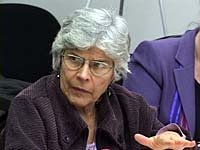
Helen Rodriques Trias: I want to ask a question, Uganda, I think, is the only country that is making any headway in terms of lowering the rates of HIV. In Africa.
(aside) Senegal is also lowering their rate.
HRT: Senegal? What is right? What is going on that is working?
Betty Ocan Aol: We have community based organizations: Originally we had a structure called District AIDS Coordinating Committee where people at the district level come and discuss AIDS strategy. At national level, we have health sector taking AIDS as a priority. And then we have also an AIDS Commission at the national level. From national to the grassroots, we have AIDS counseling, units, and going even down to the community.
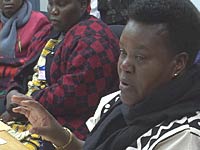
Salome Mukisa: Just to sum up what Betty has said. The truth is that the success of the fight against AIDS has been the result of the positive AIDS policy and attitude. Because right from the word “Go” when the government realized that we were living with AIDS, it took steps to talk about it and accept. Other countries did not want to hurt their tourist industry, by keeping quiet about it, but Uganda says, “To hell with tourism, we must inform the world and our population that we are sick.” So I think really it is an attitude of government. I remember in 1986, that is when we came face to face with it, it was government policy that any government officer who went out to talk to the people, had to talk about AIDS. You had, by policy, to say something about AIDS. Just like in recent years, there has been a policy that every government officer who goes out, must talk about immunization of the child. And especially by our president who was giving the lead.
Lydia Bakaki: And also a lot of research work has been done on the transmission of AIDS from mother to child. And its reduction. Also, there is a drug, I think it is called nevirapine, which is being given free of charge to each and every mother. But there is a problem of breast feeding. Some children do not get AIDS at the delivery stage, they also miss it when they get their nevirapine, but later on because the mother has insisted they must breast feed because they they do not tell their partners that they are actually HIV positive, so they must continue to breast feeding to give the impression that all is well, that has been the problem. So now the fight is, Do not breast feed vs breast milk is the best. (knowing laughter) So it is a conflict.
Child Abuse
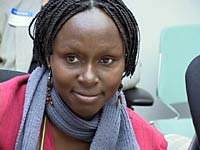
Helen Rodriques Trias: I wanted to ask about child protection. Are there any laws that protect children from abuse? Exploitation? Do you have any legal framework?
Lydia Bakaki: Children are children, it is difficult for them to report and take advantage of that law. We have a children’s statute, which is recent, and the advantage is that law is more up to date than all the other laws because it came after the constitution. So that law protects children from exploitation, it says they have a right to be cared for by their parents, each and every thing, almost the way it is in international instruments. Like they just copied each and everything and it is there. But it is difficult for a child to take advantage of that.
Something also that made it better, even if you do not have a stake in the case, but there is a child that is suffering, according to the statute, it is allowed for you to complain on behalf of the child.
(question:) Teachers or everyone?
Anyone in the community.
Then there is also the introduction of the family and children’s courts. It is not yet too functional, but they are in the process of being established. And they are held in camera, you know, not a very hostile court environment, so things are improving. The problem is that children, anyhow, are children.
Solome Mukisa: The councils at all levels have a representative of the children. At village level, county level, in that government structure.
Lydia Bakaki: And if you hold the office of health, you are also a children’s advocate.
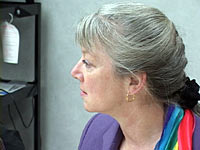
Sheila Delaney: So the Convention on the Rights of the Child is being implemented.
Housing / Land Policy
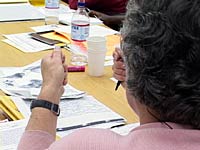
Lydia Bakaki: And then another problem (in Uganda) is nutrition. Because in most places, it is the women who feed the children, but women do not make decisions on what to plant, apart from the essential foods. And essential foods are mainly starch. They are mainly cassava, maize, and matoke, that kind of thing. So that becomes a problem. The mother cannot make the decision to get more nutritious food for the child or the family. And there is also the mobility of women from home to home. Young children come in to be wives, and look after the children who are in the home, and they themselves are children, so they cannot make good decisions.
Betty: Maybe you could explain the housing component (in San Francisco) a bit further. What is the program like?
Dr. Marcella Ogbu: In San Francisco, I am not sure if there is any housing. There are lots of homeless people in San Francisco because the rents are so high. I have a nurse that has just moved to San Francisco, and she found a two-bedroom apartment for $2600 a month. So it is really very expensive.
There used to be what they call Section 8, which is something that someone with low income can use to get a house. But they do not have Section 8s any more in San Francisco.
Roma Guy: it used to be that if you had a Section 8 voucher, the government would subsidize your rent. But even now, when you show up with this, they say no. Because they can triple it by offering it (the rental unit) to somebody else.
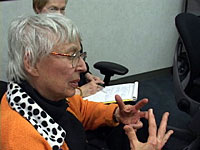
Carolyn Marx: There are thousands of people waiting to get into subsidized housing. And they are paying almost all of their income on their rent. So they can’t eat properly. And they cannot get medicine properly. Particularly in San Francisco.
Lydia Bakaki: But there are many people who share houses?
Roma Guy: Oh yes, especially in the immigrant community. They call it doubling up. They may quadruple, but the expression is doubling up. Someone sleeping on the sofa, and under the chair, and everywhere else.
Yvette Hockburg: Even Americans are living like that now. I know people who have had to move out of San Francisco and are living two hours drive away now. They travel two hours each way to work, because they cannot afford to live here any more, and even those neighborhoods are really expensive now.
Roma Guy: So it ultimately becomes in the end a land use problem. How business and government create a partnership for investment. That is true everywhere in the world. You have your version of it, and we have our version of it. San Francisco is a very small place, and we have 750,000 during the night, and 1.2 million during the day. So there is competition for commercial space, and so this creates commercial competition for what could be a housing unit.
Sex Trade / Trafficking
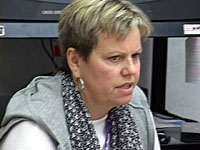
Norma Hotaling: I have a question about HIV and women who work in the sex industry. What are you seeing in Uganda and what has your approach been there?
Solome Mukisa: First I want to thank you for what you were saying, that you were once a sex worker?
Norma Hotaling: nods head yes.
Solome Mukisa: This is the type of thing we are trying to encourage in Uganda. Because for us in Uganda, it would be very difficult for someone to come out and say, “I was in this trade.” Do you think that if others can come out and accept, then others can learn. A girl can be in this trade, but can get out of it and live a normal life. I want to thank you, and I am going to share this with my people when I go back. It is very good.
Norma Hotaling: I will get you a tape to take back with you. My whole organization is made up of former prostitutes. I have 22 staff, and two of the staff are not former prostitutes. That is one of our messages, “No, we are not ashamed.”
Solome Mukisa: That’s very good.
Norma Hotaling: What’s to be ashamed of ?
Solome Mukisa: That is very good. Before I answer your question, I would like to say that another thing that has contributed to the decline of AIDS in Uganda is that type of attitude. Now people who have AIDS say, “I have AIDS.” Now it is normal. You have AIDS, but you live like anybody else. And that has really helped. It is not anything to be ashamed of any more.
So going back to prostitutes. I think that the most valuable, when it comes to AIDS – their trade is to get money. And many men who may find themselves sick, are already rejected by their wives. Now they get out there, they know they are sick, and they will not accept the condom. Sometimes I talk with the prostitutes, and they say that when you do not use a condom, you are paid more. And if I am going to earn money, I will want to earn a little more. So very often they will not use the condom. This gentleman is sick. He is already rejected by the wife because she knows there is a problem … Its terrible. It’s terrible because some of the prostitutes we have are very young. As young as 14. They cannot make a decision. They don’t even know that AIDS kills. They are not informed. They are out there to make money. So I am sure that if there is any growth in AIDS, it is more with the prostitutes.
Yevette Hockburg : And now they are getting even younger children. They say they are virgin, so they are safe. They are getting little girls, even as young as 8 years old.
Solome Mukisa: Exactly.
Yvette Hockburg: In many countries around the world.
Lydia Bakaki: The program in Uganda is that the law says prostitution is a crime. Now there is a conflict because it is happening. (laughter) It is still a crime.
(aside) It is a crime here too!
Lydia Bakaki, Oh, it is?
So, it becomes difficult for government. For example. to extend health services to prostitutes, because it is not really an organized industry, it is there flourishing in the street. So what is happening is NGOs are going into the streets to look for, you know, people who go out in the night, but it is difficult to press their addresses and things. But there is a lot of NGO work that is going on. And churches are also going there. But it is predicted that in a short time, it will become legal, because the week before we came the vice president was talking to prostitutes and saying that we are looking into your problems, and things like that.
Solome Mukisa: I don’t want to agree with Lydia that prostitution will become legal in a short time. I think what government is saying is that they should put in place programs encouraging these girls to come out so that they can be facilitated to enter other trades. But I don’t see it becoming legal in Uganda in the shortest time. Because the churches are really fighting it, you know. And church is very strong in Uganda. But there is that strategy to try to get girls out of prostitution so that they can enter other trades.
Lydia Bakaki, Another part of that debate is that people are saying that it (prostitution) would be a good source of revenue, for taxation. (shrugs shoulders)
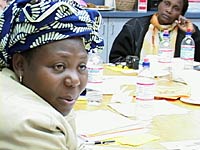
Jolly Mugisha: What I find most frustrating is that some of these girls who are on the streets are school girls. In the morning they are in class, they are in offices, they are working, In the night they are on the streets, so they are very difficult to identify. Therefore, I think that if any NGO is going to provide for them, they need to find them. Nobody wants to be identified with that trade. So it is difficult.
Lydia Bakaki, Many are university girls because the university is no longer free. That has just happened. People have not yet coped with paying school fees, and a lot of school fees. So you find that they are girls that come from relatively poor families, and they cannot continue with a university education, it used to be free. So they need to find a job if they want to go to university or get a house there, and you have a hard time in Uganda finding a part time job. So the only other thing that is available that is easy to so is prostitution.
Dr. Marcella Ogbu: The same situation is in Nigeria, so it is very interesting. You can’t really say this person is a prostitute, because so many of the prostitutes are students. They do prostitution because they need money for school and for all the things they see on TV. They want to dress very nice, and then they have to pay school fees of course. In Nigeria it has never been free, and so they pay school fees of course. These girls really cannot afford to pay school fees. If you are identified as a prostitute, the likelihood of getting married is little – in a society where being married defines your status. So these are big problems, it is probably the same thing in Uganda.
Roma Guy: since you outlined how the medical system is being set up, if someone came to a primary health center who was a sex worker, like if she was pregnant for example, would she come? Would she stay away because she would have to say who she is in order to get services?
Solome Mukisa and Betty Ocan Aol – She would not say.
Marriage and Childbirth
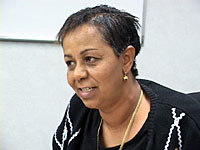
Mimi (Meserak) Ramsey : Where I come from in Ethiopia, marriage is forced on us, at 12, 13, 14 years. They want to marry us before we have male friends, virginity is very important in that part of the world. So how is this for Ugandan women? Is marriage forced on them when they are teenagers still? Or are they encouraged to go to school more? That is my first question. My second question is, How is childbirth in Uganda? My cousin who has a clinic, she said to me, out of 10 women, two died in childbirth. They do not know how to stop the bleeding, they do not know how to stitch them quickly as they do in the United States. In the United States they have a technique to stop the bleeding and to just close it. How is it in Uganda, how is woman giving birth, especially when there is no doctor? Especially when she is out there on the farm working alone. When she is giving birth, who is helping her?
Betty Ocan Aol: We have traditional birth attendants. And these traditional birth attendants have actually been given more skills. And that has reduced childbirth related deaths. Our problem in the country is that very many women still avoid going to the hospital. Just because of fear and maybe harassment by midwives. When they are stressed, midwives cannot handle women very well. So many women prefer to have these traditional birth attendants. And sometimes with cost sharing, some women feel that they cannot afford the necessities like a baby shower, to get the basic baby equipment. But the death rate has gone down by upgrading the traditional birth attendants.
Lydia Bakaki: About marriages, you are asking about marriages. Of course, that used to be the traditional way, of getting married and marrying. But it has reduced remarkedly. Especially if you are going to school. There is not much about matchmaking. Everybody gets their own husbands. But the poorer and the more rural the families are, the more likely it is that they will get somebody for their daughter. And then they should not to refuse. If they want to refuse, they just have to run away, maybe, to some relative that is sympathetic. That is maybe in 20%, maybe. And then also, in Moslem communities . . .many of them still practice that.
Mimi (Meserak) Ramsey : In Nigeria, it was in the newspaper, like everybody else, I read it I the newspaper, and it almost stopped my heart. A nine year old girl – her marriage was arranged to a 45 year old man. She is the third wife. So – nine years old – she entered into the marriage, not knowing what is going to happen, and the man sexually abused her, I mean that was his wife, he had that right. But then what happened, this nine year old, she runs to Mommie. She keeps running to Mommie, and the husband was upset. She kept running and he is wasting his time bringing her home from Mom’s house. Finally, he chopped one of her legs. That way she can’t run any more.
Yevette Hockburg: That is not uncommon.
Betty Ocan Aol: That is India.
Yevette Hockburg: I saw it myself when I was living there (in East Africa)
Lydia Bakaki: That is not common in Uganda, now.
Family Planning
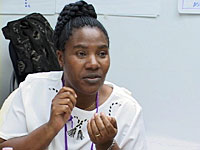
Betty Ocan Aol: We are trying to go by family planning. It is handled like a kind of NGO. It is practiced in the hospital, but not very much. It has also its own clinic. As I told somebody, some of the clinics were closed. There were about 25 clinics in Uganda, but recently they closed most of those clinics because of funding. The funding was coming I think from Planned Parenthood. So most of them have been closed. Only 7 have been left.
(question) In all of Uganda?
I think so, yes. All of Uganda. The district where I come from has been closed. So we have a neighboring district. And why it came to me very prominently, my office was approached to try to lobby the district to support that clinic so that it is not completely closed. The people in the district need the service very much. Well, we are in the process, we are still discussing it.
It is a big problem when it comes to personnel. For contraceptives, things like that, it is okay, but when it comes to personnel, it is a bit hard. So those problems are there. We think we shall discuss it and come to a place where we can put it to rest.
(question) Do these discussions happen at the district level, or at parliament?
Betty Ocan Aol: It is the district. When I talked about family planning clinic being closed, it is for Gulu District. One of the districts in Northern Uganda. I am the health secretary at the district level, that is why my district was approached. In parliament, I do not think they have started addressing that issue as yet.
Lydia Rwakishaya: As she was saying, most of the units were closed, but these were Family Planning Association of Uganda, as an association. But in the government districts — any health unit, now there is a very big and extended activity of family planning. Staffs are trained. We have got a lot of good ideas about family planning. We even have good centers with reproductive health programs where people go with referrals. And we have got outreaches where you can have the services of family planning.
So family planning is integrated at health centers.
Yes.
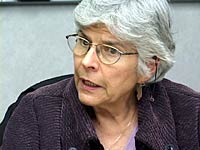
Helen Rodriques Trias describes a S.F. Bay Area project where women can get emergency contraceptives from their pharmacist in local communities. One of the things that I feel good about, because it is work that needs doing, is getting the sexually transmitted disease HIV prevention piece together with contraception. It is hard because it has always been that it is about this idea of preventing unwanted pregnancies, and it is not about other things that threaten women’s reproductive … and men’s reproductive health.
One of the things that I found, and I do not know about here because I am going to talk about some of the Central American experience of recruiting people in family planning leadership, is that they will say, “We are lucky if we can get the young people here to use one method. We can’t be talking about two methods. They are not going to be using the pill and condoms too.”
What about condoms as the first line of defense, as the preferred method, with emergency contraception as a back up? You know, like when the condom breaks, or there is some misuse of it. Which is also a possibility of how you present the choice. They are getting it together, because of the things of this pharmacy axis project, as it is called, is looking to having the condom dispensing machines right in the pharmacy – and with people who have Medical which is health coverage through governmental funds, they can just flip their card and get the condoms dispensed right there. It makes it a little bit easier.
Economic Development for Women
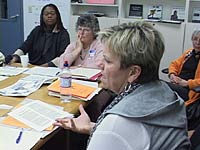
Norma Hotaling: So a lot of the issues that have come up are around poverty and economics. What do you do in your country as far as economic development for women? Because that’s really the key to prostitution, to health care, to school or more human rights and equality. Cottage industries are a big issue. Economic loan programs. Are there alternatives to prostitution?
Betty Ocan Aol: There are a lot of vocational institutions coming up. And there are a lot of women in communities coming together to put their little resources together to work on their common problems. We have a lot of income generating activities in the community to try to better our economic status. And very many NGOs support those community-based programs.
Adele James: Do they put an emphasis on women developing these skills?
Regina Sanyu: In fact, the government is encouraging women to form associations of women in income generating activities. A group uses the money in a revolving fund, rather than supporting one woman. There is Heifer, send a cow project. A woman on the farm receives the cow and has it until it has a she-calf. She takes care of that she-calf up until the 10th month, and then she gives the calf away to another member. She gets the milk; she gets the other by-products that she sells. Then within the society they form savings and credit scheme, again, amongst themselves. If a woman would want to buy something, she takes a lump sum and then she uses it, and then she brings that money back with a kind of interest. So there is money for bigger loans in their bank.
Adele James: It sounds like it works well, but if you were going to make it even better, what would you do?
Regina Sanyu: Yes, there is more, we were trained and got the skills in business. How to come up with a project, writing proposals, how to implement the project, how to evaluate – the whole cycle.
Adele James: This is all part of it?
Regina Sanyu: Yes.
(general response) That’s very comprehensive.
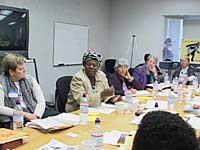
Jolly Mugisha: Government put into place projects of (something): now resources come from the national level to districts. Now every district as an administrative unit sits down – you have local councilors, you have heard people introducing themselves as councilors. These people sit down and plan those areas. And they have the resources from the center. And the money they collect from the people in form of tax, they are planned for at that level. So that if what is needed in their area is income generating, then they can establish credit schemes, like Regina’s. If they find that they are lacking a road, then they will concentrate on that. That policy of decentralization is helping women especially, because now women get to vote, we are talking about gender budgeting. I think we are on the road to development.
Betty Ocan Aol: Alongside local council, there is also a women’s council which focuses mainly on development. Women’s Council, that is from district, sub-district, county, parish, down to village. We have it 1 to 5.
Beth Mwebaze: As we have talked for those who go for prostitution, are youth. So government has a program for youth. This credit scheme – it is for women, youth and people with disabilities. They also get that so that they at least can earn a living.
Lydia Rwakishaya: There is a program of poverty eradication. Actually it is nationwide. Because most of the women do earn money either to buy their children clothes, send them to school, or do some other activities. For example, it goes to schools, so that when the government buys something for the schools, the parents will keep what they would have had to put there. It also goes to agriculture. It has improved the methods of farming so that people would be able to produce more. Improved methods of farming. And it goes to road construction. You know, it goes to activities which when they are improved, they will be able to earn more income.
Regina Sanyu: Like in my district, women are digging roads. We voted for women’s organizations to have tenders. If there is an area where they would want to put a better road, and that area has got a well organized group of women, we find that group gets the tender. They get the hoes, they select one day in a week, and they meet there and they dig off that roadway. And so they earn some money.
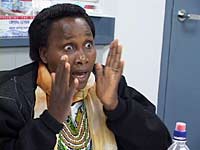
Many women are getting it, and the men are shouting, “But we used to dig up the road, but now the women are. What are we going to do? The women – their eyes are open.” (laughter)
So we do not fear. Before, we used to say, “What would people say if they see me digging the road?” But this time we understood that becoming independent, the most vulnerable thing that made women be able to be beaten, now we are fighting this. There is no shame for work. As long as we know we are going to earn, we are doing it.
Norma Hotaling: That was my question, with all this economic development and independence, where is the backlash? How is violence being used against women to try to keep them down? Because violence is a health issue, what is the strategy to deal with that?
Regina Sanyu: This is why government came up with each council having one-third of women representing from the village council upward. When women get problems in the village, they go and inform their women representatives on the council of the village. Then they go into matters. Then if matters continue or become worse, then they go from the local council to the second and the third. And eventually the man is penalized for either having beaten the woman or what. So men are fearing this.
Sheila Delaney: So some of it is being willing to be public about it.
Regina Sanyu: Yes.
Roma Guy: But they have representatives who will do this.
Regina Sanyu: Not all the women have become bright enough and will stand up and talk about themselves. Some of them hide that their husband is beating her. But when she tells her friend, there, who represents other women on the council, then that friend of hers will go there and say, “Ah men, you are beating us. You, man, you beat your wife last night.” So they go into those matters as women representatives.
Lydia Bakaki: There is a problem that developed with women making some money at home. Because the man usually takes center stage in deciding what the family income will do – the woman works so hard, and then when the money comes out, the man still has a say. It is now a problem that women are having. Because you know, you are earning the money and then you may be beaten. So, women are really getting discouraged about coming out of dependency. Saying, “When I have the money, the man will never ever spend any money until my money is finished.” He says (to the children) , “You have school fees, your mother has money. You talk about food at home, your mother has money” And the woman says, “Now what am I benefiting?”
I also need to clarify, that this government credit scheme was originally a general program for men and women. But after the first and second round, it was discovered that the women were paying back the money. The men were not paying back the money. Most districts are finding that it is easier to give the women, that the women put it to use and also return it.
Solome Mukisa: We are brainstorming on what Lydia B is talking about. Women pay back their loans. But sometimes this is a disadvantage for women. What happens is because they are embarrassed to not pay the loan, even if they have not done well with the credit; they feel they have to be able to pay. So it is not an indicator that she is doing well, that she has had success.
(aside) It is an indicator of integrity, rather than success.
Regina Sanyu: The woman sits back and reflects on her geography. If she were taken to prison, who would take care of her children? So she even borrows money from another association to pay back the loan, so she continues working on contract digging on agricultural labors so that she pays back. And she continues caring for her children.
Dr. Marcella Ogbu: One of the problems we have in Nigeria is between cash crop and subsistence farming. And men owning the land. How does that play out?
Betty Ocan Aol: Still men control the land. Now in Uganda most of our women have taken up this subsistence farming. But their crops are cash crops. It is very difficult now to cut out a boundary between subsistence and cash crops.
Lydia Bakaki: For example, if you grow coffee, if it is the ordinary coffee, after you put it in the ground, it takes 5 years. A better breed may take 2-3 years. But after you’ve planted you do not have to go back to the garden several times to do the same type of work. And it also brings in much more money than if you grew maize. So what is happening is that many women, because they do not control their land, they have a fear of growing coffee. Or growing trees which take 20 years. They say, “I do not know if tomorrow I will be here.” So what happens is they grow maize.
And you know what happens when everyone is harvesting. The price is 5 cents. And if you keep maize for a long time it rots. And those who have tried to grow other crops have been chased off their land. After the coffee is doing very very well. And they go to their homes where they are born, and they cannot plant again.
Jolly Mugisha: Because all the land belongs to the men, we encourage women to do the non-traditional jobs like keeping bees, something that does not require big space. So that when they are sold, the money goes directly to women. They are the owners. Otherwise, you plant in the garden. The man owns the hoe. Even the tool you use to dig the garden. So we tell them to think.
Dian Harrison Greets Ugandan Women’s Delegation
Marilyn Fowler: Dian has been on the advisory counsel to the Uganda project and the planning committee.
She will be one of our delegates to Uganda.
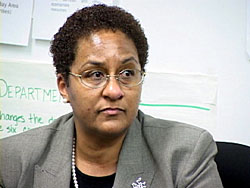
Dian J. Harrison, President & CEO Planned Parenthood Golden Gate
“We are so thrilled to welcome the women here from Uganda. We are pleased that CAWA has decided to use our offices for their meetings today and that they will all join us at our Roe V. Wade luncheon at the Nikko Hotel.
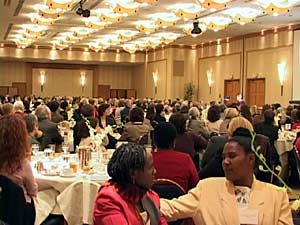
In addition, this the celebration of the 28th anniversary of Roe and our new Presdient plans to impose the Global Gag Rule once again, thus placing restrictions on NGOs in other countries that provide birth control services to women. Those organizations who receive US dollars to provide contraceptive services for women, can not use their own money to counsel, refer or perform abortions for women who have made that decision. This is what we call the “Gag Rule”. Health care for women in other countries is at best marginalized and the imposition of these rules does nothing to change the situation in developing countries.
We have a lot of work to do and want to be able to support women with birth control services all over the world. We will need to convince our President and Congress once again that providing family planning services is vital for women and their families everywhere. Having the women here in our offices from Africa today only makes the day more compelling – family planning is a global and a local issue for women.”
January 23, 2001
Mary Lou Holt, Mayor of Yountville, California speaks to Ugandan women at a luncheon for women leaders in Napa county.
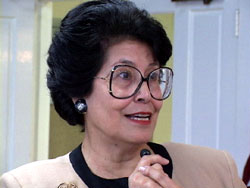
Mayor Mary Lou Holt, Yountville California
Mayor Holt begins by introducing her mentor, former mayor, Carlee Leftwich (below).
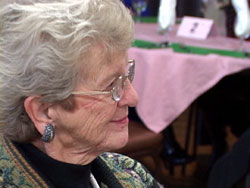
I started out giving in community service, and it seemed to me just a natural extension of that contribution for me to run for office… In March will be the completion of my 7th year as mayor.
We are here today to talk about women leaders. Women who rise above the norm. Who decide that it is not enough just to be comfortable. It isn’t enought just to suffer through certain things and not share.
We are here today to share. To share professional stories, to share what we would like the world to be if we had a greater say in it. Because that is really what it is all about. To tell our stories. And to ask. And even if it takes begging, we will do it. If the mission is clear enough. And if the dedication is strong enough.
What prompted each one of us to come today? It is a rainy day. It’s the middle of the afternoon. We had to adjust our schedules.
This is my friend Charlene. She wanted to meet successful women, and is working on a project in school. I am proud to say she is one of my youngest friends and very dear to me.
Charlie Toledo Director of the Suscol Intertribal Council speaks on the women’s movement
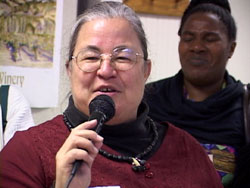
This is not the beginning of the women’s movement. It is not the end of the women’s movement. We called it an axis, it is a turning point.
And that is why we said, use this as an axis in Napa county, so it would be a turning point. One person alone can be an inspiration. But a group of people working collectively can be a transformation.
And that is what we are working for here, a collective transformation. You get a certain mass, what is that called? (audience — critical mass) I knew you would know.
You get a certain critical mass and then spontaneously change begins to occur. And all of us know that coming here, and what we as individuals represent, has not come easy and we have been doing it all of our lives.
January 24, 2001
Congresswoman Barbara Lee pays tribute to women from Uganda and the U.S. in theCongressional Record
“We often think of the Bay Area and Silicon Valley as the world’s leader in producing technology, but now we must also recognize that the Bay Area is playing an important role in producing the next generation of women leaders throughout the world.”
Mayor Jerry Brown of Oakland, California proclaims “Ugandan Women Leaders Day.”
Oakland, California
WHEREAS, Oakland is ethnically and religiously diverse, celebrates its history of cultural good will and fellowship, and strives to confer respect and grant opportunity to every member of its community; and
WHEREAS, The Women’s Leadership Institute at Oakland’s Mills College brings women together from across the country and around the world to share ideas and strategies for enhancing the role of women in decision making and expanding women’s opportunities for leadership; and
WHEREAS, This “Dialogue on Cultures of Power” is an important first step in forging a lasting partnership for change between present and future women leaders in the San Francisco Bay Area and Uganda; now
WHEREAS, I, Jerry Brown, Mayor of the City of Oakland do hereby declare Wednesday, January 24th, 2001
“UGANDAN WOMEN LEADERS DAY”
in the City of Oakland and encourage its recognition by all its citizens.
Dialogue on Economic and Environmental Justice
Hosted by Oakland YWCA and Women of Color Resource Center
women of courage
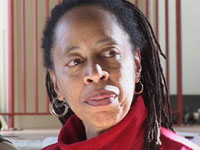
Facilitator, Linda Burnham, Director of the Women of Color Resource Center. The office of the Women of Color Resource Center is in Berkeley. One of the pieces of work we do has to do with welfare reform. Legislation passed in 1996 changed the bottom line for women living in the United States. In addition we have a women’s economic literacy collaborative, to help grassroots women understand better the economic forces that impact their lives. So we work in New Mexico on Native American indian reservations with people who are trying to develop businesses to support the social programs that they have. And we are working with women who work in factories on the border of Mexico in exploitative conditions. We are particularly concerned with the situation facing women of color here in the United States. For us that means African-American women, Latinas, Asian women and increasingly Arab women living here in the U.S.
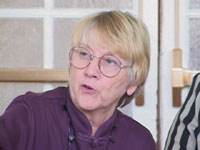
Jackque Warren is the Director of the YWCA,and welcomed everyone to the dialogue on Economic and Environmental Justice. She is also CAWA Chair of the Girl Child Task Force.
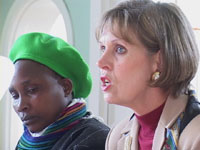
Jenny Irwin, Women’s Bureau of the Department of Labor. I want to share a poem with you called Women of Courage.
Women of courage. You are here today among us,
Fighting your battles to be yourself
To feel valued
To experience love
To gain respect
To take risk to use your many talents and abilities.
Women of courage, You are here today
Bearing the scars of life’s ugly wounds.
Betrayal, fear, violence, disappointment.
You do not give up.
Some of you have lived on the street.
Some have made a car your home.
Others have turned to drugs and alchohol for comfort.
And most have faced depression, ridicule, abuse,
Poverty, humiliation, disease.
Still, you do not give up.
Women of courage, How do you stay so strong
With these terrifying forces trying to destroy you?
And with so many barriers in your way.
Again, you do not give up.
Women of courage, your faith and persistence amaze me.
Your humor and your laughter recharge me.
Your wisdom and your strength inspire me.
And your salty tears heal my wounds.
Women of courage, I honor and I salute you,
My sisters in this journey called life.
I believe that all of us here today are women of courage. In our own lives and as we work for other women. And we are all sisters.
This is a poem I wrote when I heard a story about a woman who did not have economic justice. She had lived on the street. She had lost her children. Through education and training and a support structure, she had gotten skills and been able to get back into the workforce. When I met her she had just purchased a home and had gotten her children back. She did not give up, and a lot of people were there with her. One of the groups I hope is there is the Women’s Bureau. The Women’s Bureau has been around for 80 years. We are the only agency that is in the Federal Government that is an advocate for working women. We have helped bring about fair labor standards, the family medical leave act and the issue of equal pay. For every dollar a man earns, a woman only earns 70 cents. For African-American women it is only 65 cents. For Latina women it is 55 cents. For women with disabilities it is 47 cents. So we have worked to raise awareness of the issue of equal pay.
women of strength and courage
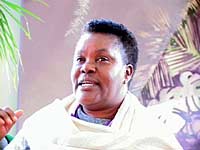
Solome Mukisa: Ugandan women are women of both strength and courage. Strength, because if you look at the work load that a woman does, you might think that they should all be dead. Normally, she wakes up around 5:00 am, and makes sure that everyone is up and fine to go to school. The children to go to school, and the husband to go to work. Making breakfast, if they eat breakfast at all in that home, and to get them dressed. When they are gone, she gets her hoe, do you know a hoe? It is a small tool that you use to till the land. So she gets her hoe and goes to till the land. On the average she is tilling the land until about 1:00. Now on her way back from tilling the land, she is expected to come back with firewood. Which she is going to use to cook the food. And if she does not have the food, she needs to look for the food as she goes. And this involves picking wild and planted leaves for her vegetables.
When she gets home, depending on the area she is from in Uganda, there is a whole process of 2-3 hours getting the food ready. If it is a grain area like mine, she has to get the grain from the store, roast it, pound it and grind it to make the flour out of it. At about 3:00 she feeds the family, and often she is expected to be the last person to eat. The husband must eat first, and eat the best of it all, then the children and then herself.
Now she cannot rest. In my part of Uganda, a woman who rests is not a good wife. She will not be respected in the village. A woman who rests is a lazy woman and will bring poverty in the home. So, after eating she will often go back to the garden to till the land. Then she makes a supper for 8 or 9 o’clock and bathes the children. If the husband does not come back, she sits and waits for him to come back. Do you know where he has been? He has been out with the boys drinking and enjoying or relaxing. Even if he returns after midnight, she must be there to serve him. And it must be warm food, so she mucst go again through the process of fire wood to warm the food. She she herself will go to bed by 2 or 3 o’clock. And do the “night service” for the husband. And if she says, “I am sick,” or “I am tired,” the man will say, “She is not playing that role effectively,” but it is because she has been working the whole day. Oh, and I forgot to talk about that part of going for water for a shower, which is sometimes as far as 5 miles, carrying a jar on her head. So that is the process of an average rural woman in Uganda. Ours are women of strength and courage.
women are overburdened
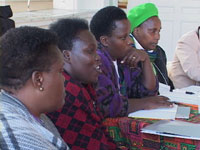
Betty Aol Ocan: If you asked a woman, “Do you work?” they will say, “No.” Because they only consider it working class if you work outside the home for a salary. Yet these women work 16 hours a day, with only a few hours for rest. Women are overburdened. We are trying to sensitize the men. But we need to bring into place appropriate technology, like food processing machines, to grind, for example, to reduce the time of a woman so that she can rest and participate in community life.
Women have a really heavy work load. Overburdened, but have no control of whatever comes out of her work. And it is the same with the girl child. Whereas the boy is able to relax and do well in school.
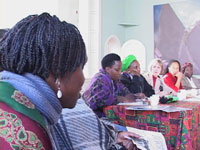
Lydia Bakaki: We used to think it was only the rural woman who was suffering, because she was doing a lot of work. But when we looked at our schedules, ourselves, we find that we are expected to do what a typical woman is supposed to do, and in addition to that you are expected to perform well at work. So leave work at 5:00 and when he comes home you are expected to make a cup of tea for him and present it. He won’t go to the kitchen to make it. Or juice, and give it to him. Even if you have a maid in your house who is the cook, you are supposed to make sure that she has cooked the right thing that is what he likes. And you are supposed to make sure that the children have done the homework. While the typical Ugandan man is putting his legs up on the table and reading the newspaper. In fact, it is usually the men who watch TV. Women in that time are moving up and down: are the children bathed, you people who I left at home, the place is not clean. And the man is just sitting. So we found that it was actually worse for the working woman. If she doesn’t then the relatives of the man complain, including the man himself. “She is not acting like a woman in the home.” If the man goes in for some house help and has a child with them, people will say, “He had to do it because that woman doesn’t cook.” There is no sympathy. Everyone is saying that she deserved it. She is not doing what she is supposed to do.
Jolly Mugisha: we are trying to sensitize men to get involved in all this work. Men are not expected to do work in our community. But we are telling them that the time has come for them to get there. Because women were doing all that work Lydia has talked about. Just because men were the bread earners, they would bring money, and even though the woman was doing all this work all the day in the garden, cooking the food, we believed that it was the man who was looking after the family. Now women’s organizations are saying, “You men, you have got to get involved in maintaining the homes and looking after the children.”
women are undervalued
Lydia Rwakishaya. I want to share what is maybe the worst part. Something that you have done in the home is not valued at all. For example, women do the digging. They do the care for children. They do the clean up. Everything. But when they are talking about that family, it will be a man’s home. It will be a man’s things. Everything will belong to a man. The woman won’t have anything of that. And yet, she does everything in the home. So we work a lot, but there is no value for the work that we do.
Betty Aol Ocan: It is the man’s relatives, they are the ones that attach the man’s name to everything. When you buy, it is not yours, it is your husband’s. You can never own property. It is the man’s relatives who are very proud of that.
(question from audience) With polygamy, is there less work because there are more wives?
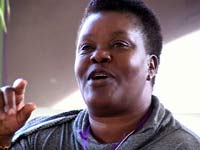
Solome Mukisa: It can’t be less work with another woman, because when this woman comes in she is going to have as many children as the other one. So there are more people to look after, and it means more workload. And when there are two wives, each one must get as many children as possible because that gives status. The more children you have, the more status you have in your husband’s environment. And the more sure you are that you get some property from your husband. Especially when there are sons. And the more sure you are that you will never be sent out of that house. So more wives just adds to the problems.
Betty Aol Ocan: The limited resources which the man has, these have to be shared between the women. They do not live in the same house. They have different houses. The land is very small, actually. So it is even more of a problem.
women are overburdened and undervalued
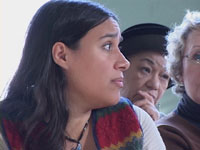
Facilitator: In the Fourth World Conference, this was something that was very high on the agenda. The inequality of the amount of work that men and women do. And the fact that the work that women do is undervalued or not valued at all. It is not counted in the gross national product, so whereas women are tilling the soil, and doing 90 percent of the sustainable agriculture that keeps the family fed, that is not considered as part of the gross domestic product. Women’s work is not valued by the statisticians, by the community or by the men. And when women say, “I don’t really work,” it is not valued by the women either.
The opposite side of that problem is the tremendous inequality in leisure time. In villages and towns all over the world you see men sitting and talking and drinking and chit-chatting. Never did you see that of women. They were always working. Carrying water. Carrying wood. Carrying children. Cooking. There is a vast inequality in the amount of leisure time. Particularly in rural areas around the world. And this is passed on to girl children. So their social and cultural development lags because they do not have time to sit down and think. Their tasks and burdens are so great.
Audience Participation. In my culture when I was growing up, what I noticed was that the boys got a little more food than we did. But they also got spanked harder. How is it as mothers to know that eventually they will take this role over you? How do you feel?
Betty Aol Ocan: You raise up a girl to be submissive. And the boy to be assertive. To take up the role of control. The girl, you know, is listening and doing everything. A girl at about 3 years old gets a lot of instruction from the mother. You are to be submissive. And the things your mother does, these are the things you have to follow. But the boy, he is somebody who is going to be the owner of the home. He has to be assertive and almost be like the king. And it is we women who raise up those children. So we cannot blame the men, it is the society.
involving men
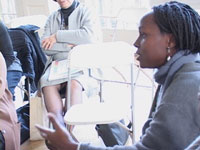
Solome Mukisa: You find in the house statements like, “Boys don’t cry.” Or, “Don’t do this like a girl,” if he is doing something feminine. Or to the girl, “Please, sit like a girl.” We kneel, you know. Girls kneel.
Lydia Bakaki: When you bring up your daughter in the way of justice and of human rights, you also risk, when this girl goes and meets a man in Uganda, what will happen? So women have that fear. They say, yes, it is oppressive the way children are brought up, to tell this girl that she must be the donkey in the home, but if my daughter does not do these things, she will never get a husband.
Regina Sanyu: Our women have been sent away from homes because some of them produced many girls. But now with training some men are seeing the role they play in determining the sex of the children. It is not her fault, if she has two girls in a row. So the NGOs are training the rural women on these things.
Lydia Bakaki. There was a woman who said one time that she used to plant her crops, and the man would sell and he would get another wife. So one time she said, I am walking out. As an activist, I knew that this woman has no place to go. But she went, she stayed on her own and started doing small trade until she actually bought her own land. And she used land of other people in exchange for some of the crops. And now she says, “I am so happy, because I did not know that I could control my own money.” She did not have a child, and so was looked down on in that home. She was just being used
Betty Aol Ocan: In the early 1990s we were just targeting women for the gender awareness training. And we knew there was very little impact. So we decided also to involve men. Then there was dialogue and men welcomed it. But when it was women in isolation, the men did not like it, they felt that we were fighting them. They began to see it as a change, not to deprive them of something, but to make the home a better home for all of them to live in.
January 25, 2001
Training Day at Women’s Technology Cluste
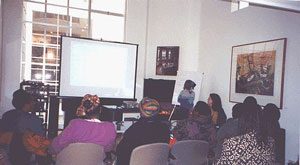
Cynthia Gehrie leads the Ugandan Delegation through the archival site of their visit. This was part of a training session coordinated with Wangari Nyanjui, WIN Intern and Graphics Design artist from San Francisco State University
Additional presentations were made by
Michael Saunders , CEO of HandsNet, Inc.
Carole Roberts, an independent consultant
Lorrie Johnson, Global Philanthropy
January 26, 2001
Dialogue at Hewlett Packard
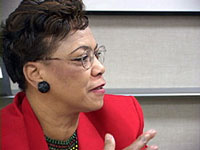
Bess M. Stephens, Director of Philanthropy and Education, Hewlett-Packard
I want to wish you that you will have a good time for the remainder of your stay, and I want to wish each of you well in your advocacy and your political activities when you get home back in Uganda. And, I would like to say that I would welcome an invitation to join Marilyn Fowler when she comes to Uganda. Would this be good?”
Miria Matembe, Minister of Ethics and Integrity for the Republic of Uganda
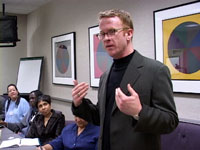
John D. Hassell, Director, Public Affairs, Government and Public Affairs Department, Hewlett-Packard
At the national level we are lobbying on education issues, on visa issues so that we can hire people from all over the world to come work for HP, and also trade issues.
(At the state and local level) we work on land use issues, very important to us, we work on transportation issues … bringing rapid transit to our crowded cities.
And now with the focus on digital village and e-inclusion we will really address the problems of the haves and have-nots in our country and in the world.
I have a question for you: I saw an interview with your president. He seemed very progressive in comparison to some of his counterparts (in Africa). And I was wondering about your reaction about your president.
And this is more on a personal note. My church invited a choir from Uganda and they were all orphans from families affected by HIV and AIDS. And it was very touching because I did not know the extent. In my community in San Francisco we have been devastated by HIV and AIDS. And so we brought two communities together that really had common understanding of a particular health problem.
It seems like your president was doing a lot of really good work.
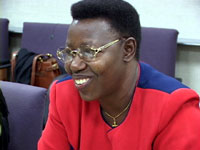
Matembe: 1986 was the time we came to know that AIDS was actually in Uganda. He (the president) took it up personally and made it a public campaign on his presidential platform. He made it clear to the whole world that AIDS does exist in Uganda. Contrary to all the other leaders who were afraid they might ruin their tourist trade. Because people had died so much out of wars, and he did not want any more more dying of AIDS, so he wanted to make it clear and open that we were against AIDS.
And when they were saying, actually that Uganda is the worst hit, they were not comparing with other available data within the continent. Other countries had not opened up about it.
As a result, we are now benefitting from our open policy on it by having rates of infection drop.
Hassell: They are going down.
Matembe: Yes, they are going down now, the rates of infection. In fact, all these other countries within the continent, all of them are coming to learn from us.
I remember actually that one time I was involved in this whole battle against AIDS in relation to women. Because for the women the issue of AIDS is triple jeopardy. The psychological make up of women makes them more vulnerable to AIDS than men. The social-economic role they play in Africa also exposes them to AIDS. For instance, women at home delivering babies in non-sterile conditions can become exposed to AIDS. They also care for AIDS patients without appropriate protection. And the heavy workload with poor nourishment leaves them weak, and less resistant to disease. So we had to make massive awareness of AIDS among women. We credited our president for his personal involvement, because if he had kept quiet like other countries, we would have been really bad off, by now.
At least one thing is certain, that Ugandans now understand that it is a disease like any other disease. You should not shun out anybody. And that you should try as much as possible to avoid getting it. But actually the main problem we have is lack of facilities. Often AIDS is transmitted through blood instruments in hospitals, especially to mothers and at times to nurses.
Yes, you know the infrastructure of our country was really shattered by over twenty years of wars. People are thinking, these Ugandans have AIDS because they are promiscuous, but that was not the case. It was due to a combination of many factors.
January 27, 2001
DSouthern California receives Ugandan Delegation in Camarillo
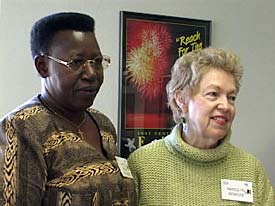
Marilyn Fowler, President and CEO, WIN
“It is my pleasure to introduce to you the Honorable Mira Matembe, Minister for Ethics and Integrity, and the delegation of women leaders from Uganda. They traveled many miles and over 24 hours to come to California via Nairobi and Amsterdam. They haven’t even had time to recover from jet lag and have been such good sports about driving all over our state for a series of dialogues and welcoming events such as this. Please welcome them now to southern Calfiornia!
The Honorable Miria Matembe Minister
The Minister of Ethics and Integrity is certainly not the agenda here, but since I wear the hat….(laughter) you need to know about that also so that … actually you need it. (laughter and applause).
When she (Marilyn Fowler) was talking she said that in over 24 hours of flight the women were not crashed or tired, the African women have so much resilience. (laughter) Bearing in mind what they go through, a flight of 24 hours is nothing. We know that the images you see on the screen, they are always the bad ones. They never show the strong women of Africa in their different circumstances. However, we are glad to be here and make friends with you sisters over here.
Generally I am a woman activist. We call ourselves activists, but in the real sense we are feminists, but we fear using the word for the connotation it brings in our continent. Because people think when you are a feminist you are a rebel who is busy breaking down marriages and destroying families. We call ourselves activists, and don’t worry the word because the work is the same.
News Article by Marianne Ratcliff in Star Opinion
Calling the Circle of Women
UGANDA: Links formed during Camarillo visit.
Friday February 2, 2001
Mothers, daughters,Women everywhere,Stand up and demand your rights today.
We are the proud mothers of the nation.
The backbone without which it cannot stand.
With love and joy, we care for our baby, Uganda!
This is the “Women’s Anthem,” sung by eight Ugandan women, hosted at a brunch on Saturday by the Ventura County Commission for Women in Camarillo.
In 10 days, they met with hundreds of women in Northern and Southern California, before returning home on Tuesday.
Organized by Women’s International Network and the California Women’s Agenda, the purpose of the visit was to establish a partnership between women of Uganda and the United States, with communication to be maintained through the Internet.
Few of the local women who attended knew much about this east central African country. Unfortunately, according to Miria Matembe, minister for Ethics and Integrity, most of what U.S. citizens do know of Africa is from negative images on TV news.
When Marilyn Fowler, executive director of WIN-CAWA, introduced the group, she described their journey, which took them to Kampala, Nairobi, Amsterdam and San Francisco, over 24 hours.
The long journey was nothing, Matembe said. “The African women have so much resilience. Bearing in mind what they go through, a flight of 24 hours is nothing.”
The images on the screen, she said, “never show the strong women of Africa in their different cir-cumstances.”
There is, according to Matembe, much to be hopeful about, as demonstrated by the seven other accomplished women who accompanied her.
A lawyer and Oxford graduate, Matembe helped write Uganda’s constitution. Her position in the president’s Cabinet was created to counter corruption, bred over more than 30 years of war, and instill ethical values.
And just as in the United States, Matembe and her colleagues struggle with people’s perception of their work: “We call ourselves activists, but in the real sense we are feminists, but we fear using the word for the connotation it brings in our continent. Because people think when you are a feminist you are a rebel who is busy breaking down marriages and destroying families. We call ourselves activists, and don’t worry the word because the work is the same.”
Currently, women comprise 17 percent of parliament, but at the local level, they are guaranteed a third of local elected positions.
That means women have to be trained for leadership at the local level and are encouraged to move on to the national legislature.
It is against this backdrop that the eight Ugandan women — attorneys, teachers, politicians — gathered with U.S. women to learn about our system, but also to teach about theirs.
Fowler explained that the idea of bringing together women from other countries is to take the goals of the 1995 U.N.-sponsored Beijing women’s conference to the grass roots.
Drawing from ancient customs, in which women would come together to solve problems or make decisions, WIN hit upon the idea of “calling the circle.”
And into this circle, some 50 Ventura County women and men were drawn Saturday morning.
Supervisor Kathy Long was one. “Your visit certainly says we should hold hands with women who are dealing with the same issues across countries,”she said. The meeting was an opportunity, she continued, “to grow those seeds around the world to help women and children.”
One of the Ugandan visitors, Jolly Kyomugasho Mugisha, wrote a poem, the final stanzas of which read:
Woman, the mother,
daughter, sister,
auntie or grandmother.
White woman,
yellow and colored woman,
black woman.
It is only she that builds a family, the basis of a nation.
It is only a WOMAN
who can humbly
hang on and on
For the development
of humankind.
If, as they sang, the women of Uganda have embraced their country as their baby, it is in good hands.
— Marianne Ratcliff is assistant editor of the Star Opinion pages. She can be reached by e-mail at ratcliff@ insidevc.com.
Photo Album from Cecilia Fargo
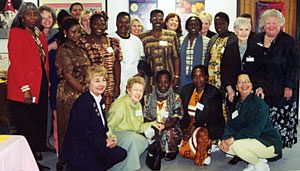
The Camarillo Connection
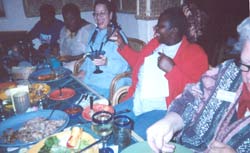
A Welcome dinner to Southern California.
Olé Mexican food is good, but “Where is the pork?”
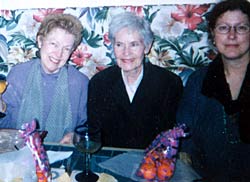
(from left) Marilyn Fowler, Cecilia Fargo and Cynthia Gehrie (documenter)
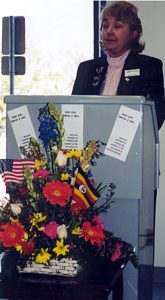
Starting our program. Welcoming remarks: Beverly Viola, Chair, Ventura County Commission for Women.
“I took a picture of the floral display donated for the occasion by one of our commissioners. Both the US and the Ugandan flags were in the display and the Ugandan delegation was very pleased to see their flag and wanted to know where I bought it, etc… The Ugandan flag consists of six large horizontal stripes in this order: black, gold and red. The bird in the center is an African Baleric crested crane which is native to Uganda.” Cecilia Fargo.
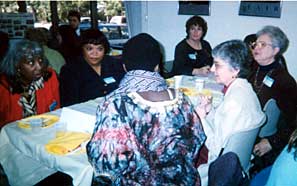
Getting answers from an expert.
We had the opportunity to ask questions of our Ugandan guests at individual tables.
African American women host Ugandan Delegation and Ugandans living in U.S.
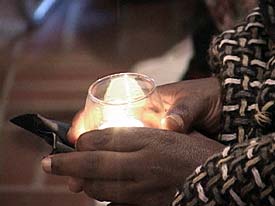
In the circle, we each light a candle and hold it as we speak to introduce ourselves.
(Akua Jitahadi, Black Women for Wellness) We have talked for a long time, Jan and I, as some of the co-founders of Black Women for Wellness, that we would like for black women in this country to be able to talk with African women. So this was a vision and a dream that has come to reality as you said, so we are just overjoyed.
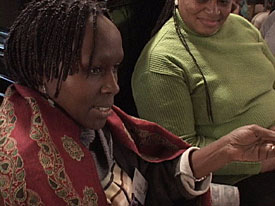
(Lydia Bakaki — Ugandan delegation) I have been in a campaign for co-ownership of land (joint ownership for husbands and wives) She (The Honorable Miria Matembe) is smiling because she knows the pain that we have gone through with these things.
I was just thinking, if I risk too much, I mean, would there be a support group, you know, people who would care that I worked hard for these things? So I am glad to see that a group of women can be formed internationally to be able to support one another. I hope this doesn’t end just here.
I have always been happy to be African and always been happy to be female. And to me, all of us share in that energy. I think that the world is in such a way right now that it is on us as women to take it in our hands and create a new vision for everybody. And I have always had a lot of faith and confidence that we could do that.
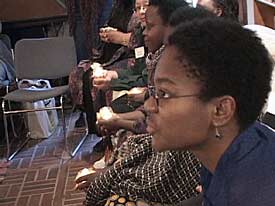
When I got to Uganda, I was absolutely amazed at the way Ugandan women were leading a legal struggle in terms of customary laws that were affecting women, and interacting with British law dealing with inheritance rights, land issues, the defilement of the girl child, how you are actually transforming people’s ideas about the valuation of women and girls. The struggle that you all have led, I was like wow, I was blown away. You all have a vice president that is a woman. We have never had a female president or vice president here in the U.S…It has really transformed how I see myself as a black woman and as an African woman, in terms of realizing that I am part of a larger group of individuals across the Atlantic. I just feel really privileged to be here and sit with you in the Circle.
I am so glad that this activity became a reality. Because when Dr. D. and Ruth and Wendy were telling me they had this idea, bringing women together, you know, do you really think that this is a .. but finally it is a reality. I was so glad to meet this group of Ugandan women coming here to open up a networking exchange. And we are certainly waiting to receive you home one of these days.
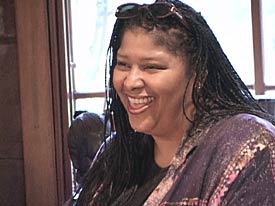
One of the dreams for my life is to go to the continent (of Africa) and spend time there and know people there. To hear that your perspective is to come and take us home, that just made me want to break down and cry.
We share food, a pot luck prepared by Black Women for Wellness

I am the treasurer for the Ugandan Association. Whenever we have a celebration, like for Ugandan independence, if we know there is a group of African American women here, we can send an invitation to them and they can send an invitation to somebody else, and spread out. Instead of bringing our independence as Ugandans only. But we have friends. So friends of Uganda can also join. We are all here, but we do not know each other.
As a Ugandan living in U.S. I feel strongly that I need to understand my fellow black women in this country. In order to understand the culture, the way they think. And I need to interact with them once in a while.
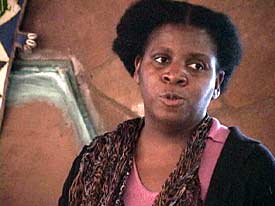
There are lots of groups of African American women in Los Angeles. We’re just talking in Los Angeles. A lot of these groups have national outreach. Are they hard to find? Well, not for me, but maybe that is because I am African American. Sometimes it depends on what issue you want to link on. I work in the health field. Is there a health issue that we want to deal with? Call on the persons who are working in the health field. Personally, I think we have a lot to gain by linking together on health issues, development, perhaps as education. Perhaps it is a celebration. Because that is something we can’t celebrate quite yet, our independence.
Black Women for Wellness: Photo Album
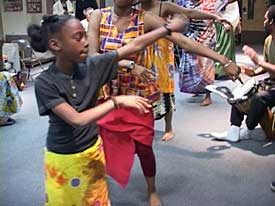
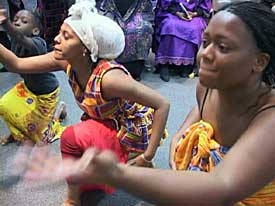
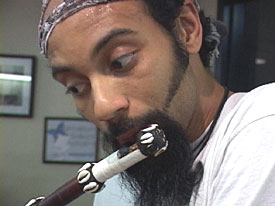
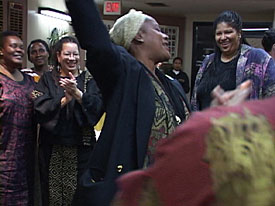
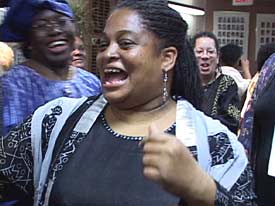
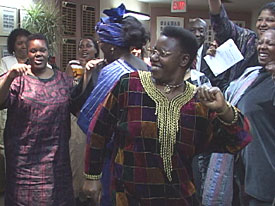
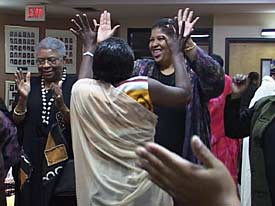
January 28, 2001
Worldbeat Cultural Center — Community Reception
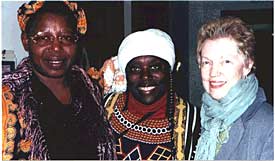
The Honorable Miria Matembe, Makeda “Dread” Cheatom and Marilyn Fowler
at the Worldbeat Cultural Center
African drummers and dancers

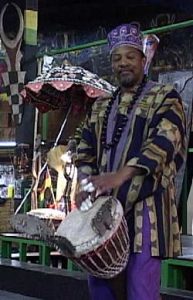
and Native Americans of California and Arizona
offer greetings and blessings for the
Ugandan Delegation at Worldbeat Cultural Center
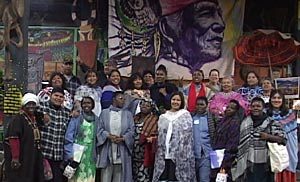
Makeda Cheatom’s statement on the strong connections between African Americans and Native Americans
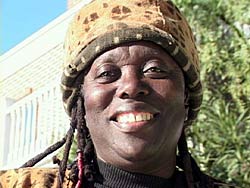
Makeda “Dread” Cheaton,
Worldbeat Cultural Center
Native American Indians are the keepers of this land. This is something to respect when you come to this country. Because they are not seen. And they are mostly on reservations all over the place. They were converted to Christianity. But they kept their roots. When they sang to you here, they sang in their language.
Most African Americans in this country have Native American blood in them. Because the slaves ran to the Indians. So my great grandmother was full blooded Indian. I learned those ways. And then I realized that they were also African ways, because they respected the land, respected the trees, they respect. So this is what they were doing (during the song prayers), but most of them are Christians. We don’t have to lose our Christianity to embrace other nations and other cultures. It is fear that divides us. It is really important to learn other cultures. And especially the Native American Indian which has been robbed and misused.
Every time I have a concert, I have the Indians open up for my concerts. Every time. Because I have to respect the keepers of this land.
Aileen Hernandez: They are the indigenous people of this country.
Iranian women host Ugandan delegation in Long Beach, CA
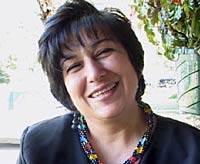
My Name is Elahe Amani, and I am Chair of Coalition of Women from Asia and the Middle East. It is a woman’s organization in California, that was established in 1991. We address the violation of women’s human rights in immigrant communities, education and outreach and empowering women. I also taught in a women’s studies program at Cal Tech, Long Beach.
(new speaker, no image) I am in Political Science at California State University, Northridge. We started a new Institute for Gender, Globalization and Democracy which is to link people around the world — institutes like ours. Groups that are doing things that deal with the political and economic condition of women. To try to improve it.
I am a lawyer by training, but I changed to psychology a few years back, so I am a licensed psychotherapist now. As I was doing my internship, I worked with battered women and also worked with youths that are involved in gangs. And I could see how family violence is widespread in the United States. For me it was an awakening. I did not know before I got into psychology. I was working in a nice law office. I had no idea what was going on in this society.
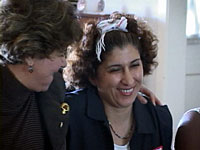
I am involved in Middle Eastern women’s studies, and I am very involved in women’s advocacy groups and women’s rights groups — human rights groups. I try to teach about women. And particularly about women, globalization and religion. Religious movement, fundamentalist movements and the impact of it upon women in different cultures, especially Moslem cultures.
By the way, she was my teacher too.
She was a very good student. (laughter)
I am a computer consultant and a women’s rights activist. And also I am accused of being a feminist writer.
And a very well published feminist writer — she writes short stories.
I teach at Whittier college, women’s studies and religious studies. Particularly women in religion.
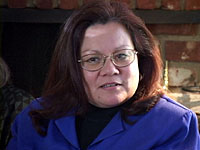
I’m a single mom. It’s been a challenge at times.
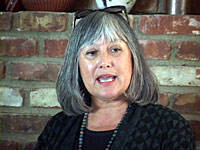
My name is Judith Luther Wilder, I am the CEO of a national organization called Women Incorporated. We provide access to capital and credit for women business owners, self employed women. We started with a loan pool of about $150 million, and it has grown over the past ten years. We also do a little bit of work overseas, India and China, entrepreneurial training and development programs. We are connected with Elahe because of the State Economic Network which is a program we run, it is a coalition of business organizations around the state.
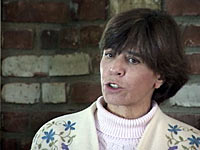
I am Deborah Russell. I am a friend of Elahe’s, I am a writer, and am also President elect of the Los Angeles Women’s Appointment Collaboration. LAWAC was founded about ten years ago when, Gee, much to our surprise, we found there was a disparity in numbers between the number of women being appointed to state, local and even federal boards and commissions, versus men. The organization was started by four women with the sanction of the Los Angeles City Council to basically train, educate and we are now at a point of, really, advocacy, when it comes to interacting with our elected officials to get more qualified women — not only appointed to the boards and commissions on an all over basis, but also getting them onto the boards and commissions where they can really make a difference. i.e., where they have some budgetary and public policy say so.
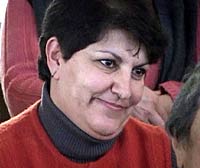
I am a member of Iranian Women. At work I am learning about AIDS in Africa. And then also with Gulf War Syndromes all over the Middle East. And the effect of it after the Gulf War, and the people in that area — which is very sad to know.
January 29, 2001
Tour at Ericsson Wireless, San Diego
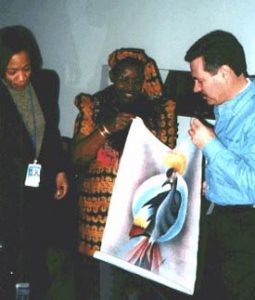
Hon. Miria Matembe presents Tony Chartrand, VP Human Resources, Ericsson Wireless Communications, Inc. with a silk screen print of the Uganda national bird, the Crane. The young woman on Miria’s right is Monica Rance.
Dialogue on Women and Political Participation
making the decision to run
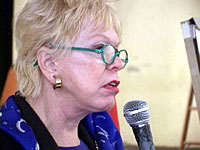
Let’s look at making the decision to run. How many of you had a tough time making a decision to run for office? What was the compelling force that made you want to run for office? What is it that propels women to run for office?
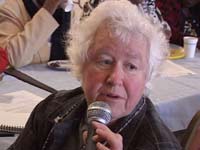
I think that women want to run for office primarily out of a desire to be of service and to improve the conditions around them in the institution in which they are running, whether it is for school board, improving schools, or for the legislature improving a more broad agenda.
Betty Ocan Aol: it is really to improve on the service delivery to our people. The suffering of the children, the suffering of the women. To come to this leadership position to make this decision.
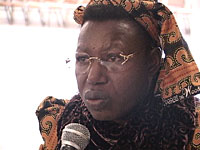
Hon. Miria Matembe Mine was very specific, out of a long standing dream, to make laws that promote the interests of women. So when I went to parliament, I just wanted to change the laws so that they can be responsive to women’s rights and interests. It has not been easy, but at least I have realized that dream to a certain extent.
When I first ran for office it was to improve the conditions in my community. But when I ran for mayor the reasons had become a little different because it was my third election It was my time and I was ready to really take leadership at that point, and so it kind of evolved over time. I would say the first two campaigns were really more quality of life based issues. But the third time, when I ran for mayor, it was because I felt ready to step into that position.
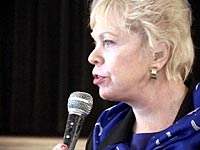
How important is it to look at the opposition?
Everybody acknowledges you have to, you have to do research on the opposition.
Are there issues that are important to the voters? Is there something that the voters are really angry about? Is there anything that we are afraid of? What are the lessons we have learned about running for office?
issues that are important to the voters
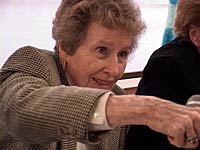
I think it is important not to be just a one issue candidate. It limits your ability to act. I think it is important to present yourself also as a person who can help solve problems There are things that do not come up in the campaign, but maybe a year later you have to be able to deal with them, and let the voters know you can.
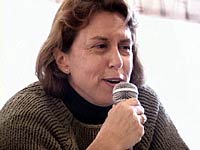
I’ll follow up on that. You have to show that you are capable of more than just one note, otherwise you sound like a nut, like an extremist. However, I was often frustrated. I felt like I could not really talk to people about who I am and the kinds of thinking and style that I wanted to bring to government, because they wanted to talk about their street closure. It depends a lot on your electorate how specific you can be and how general you can be. I felt like I had been urged to run by lots of people because they liked the way I approached problems, and yet I felt that the campaign, the forums, were much more about particulars about are you going to close that street, what are you going to do about this, that kind of thing.
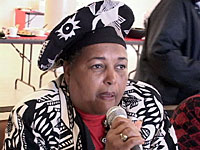
Gender is still an issue. I was the only woman in a field of 13, so I ran with 12 men. I think that our leadership style and our leadership roles need to be addressed as well as constituencies and group support and community support. We cannot combat the male-female gender issues without building coalitions and finding ways to counter balance the fact that we are female.
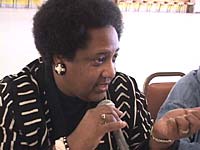
As women we decide to run because we want to make a difference and we can change things, so sometimes we come with the expertise and the knowledge and the drive to do that. And then we do run across these mundane issues of potholes and that frustrates us. But the reality is that when you are in a campaign you need to learn to speak in a sound bite. If you look at the U.S. today, we don’t like people who can think. We don’t mind you being brilliant, but don’t demonstrate it. They like people they identify with intellectually, which is at the lowest level. Sometimes as women we become too intellectual and qualified, In a lot of ways that it frightens people off. That we want to come in and change their world – which is really what we want to do. So we need to be more sophisticated in our approach. It is a strange strange world out there when you become a candidate. You have to figure it out, and if you don’t figure it out, you will not be successful. What is that community all about, what is it that it wants and what does it feel comfortable with as an elected official. Then you need to be that kind of person. It is a strange kind of being that you become when you become a politician.
the message
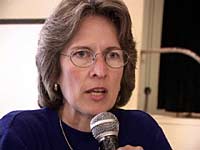
Anne: Let’s move on to the message.
I think women are very intellectual, and some successful candidates, they have everything down to a very simple yes or no answer. In my mind that was difficult because not everything is yes or no. I had a tendency to say, ‘If this, then that.” Or you couch things in terms that get too complex. So in terms of your 3 or 4 simple messages, you have to get them in one simple sentence, and something that is very easy to understand. For example, running for the assembly, I could not pick health care as an issue, even though it is an issue, because it is such a complex problem. You have to pick something like education and talk about things like standards and accountability. Things that people have been accustomed to hearing and understand. You pick some of these more complex issues and you lose them.
Anne: Okay, Solome and Betty are both running for parliament. Do you have your message ready?
Solome Mukisa: I want to say that I have run for office twice. First as a district counselor where I served for five years. And then as a constitutional assembly delegate. I want to say something about the message that is very important. Research on the message before you deliver it. Because you might have a very strong message that the people you are going to talk to do not appreciate. So my message right now is all about corruption. Because that is the biggest problem that we have. Everybody knows that it is the cause of the suffering of many of the people, especially the women of our country. So my major message in the coming elections is going to be about corruption. How to fight it.
Miria Matembe, Well, this corruption, so what. It must be one, two, three, four — Corruption.
Group, “Yes, what are you going to do about it?”
Solome Mukisa: First and foremost I am going to support the government policy. Because the government that is in there now has put in place institutions that are there to fight corruption. And I am going to be telling the people that I want to support those institutions, to fight corruption. And then, also, I want to educate them on how to identify corrupt tendencies so that we might fight them. (Applause)
Anne, I want to ask Shirley to comment on delivery.
I think one of the things you learn after a period of time about presentation is that you have a very short time to make your impact. And too often when somebody asks you a question, you give a wishy-washy answer. I remember when I was I graduate school we did the research on the Nixon-Kennedy debates, that changed the whole tenor of what happened for Kennedy in 1960. When Kennedy was asked a question, he answered “yes” or “no” and then answered it. And Nixon was , “well you know, if you kind of look at it, and you kind of go around it, and you become very intellectual because we believe the issue is broad and complex and difficult. And it is. But the public doesn’t want to know that. They simply want to know, “Yes, it is a problem, and we need to solve it, and this is what I will do.” And it is real simple. When you are asked a question, answer it “yes” or “no.” Many of us do not want to do that. We want to let people know how smart we are. That we know the issues are complex. And the public really knows that, but they just want to know if you can answer the question. It really becomes really important, that you have a short period of time to answer this question. And when the media comes to take your picture, they will probably only get a bunch of mumbo jumbo unless you say “yes” and whatever.
Anne: okay, Betty, what is your message?
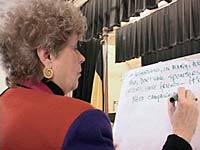
Facilitator takes notes on the dialogue.
Betty Aol Ocan: I come from a difficult district. A district which is in war right now. And my first message is to support any program which will bring about peace in my district. And also to try to promote the idea of conflict resolution through dialogue. And the second one is development. I want to support programs which will promote political, economical and social development for all of us. And I want to be down with the people. Not to change as I go up. But to be with them and to feel their problems. And also to promote unity in my district. Respect. I think that is briefly my message.
Anne: great, three main messages! Anyone else ready to comment on the message.
Depending on the setting, it is 75% hearing what the people want to say. Many young people come to me and say, “I have this platform,” and they never allow me to say a word. They come out and talk for 20 minutes about what they are going to do and what their program is, with no idea about whether or not that appeals to me. I think part of this is going out, talking to your constituency, and not thinking you have all the answers.
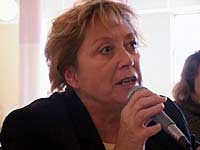
I think another thing too is to be consistent. Stick with those same three things. I had somebody say to me one time, “You’re going to say this so many times – you are going to be so sick of it. It is at that point that the public will just be starting to hear what you are saying.
Anne: Okay, what about money, do we need to have a budget to run for office? Or can we just throw our hat in the ring and it will happen? And how do we raise money?
how important is money?
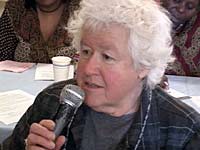
Money is , unfortunately, the most important single item in your campaign. I hope that is not true in Uganda, but it is certainly true here. If you do not have the minimal resources to run a campaign, you have zero chance of winning, unless it is a very, very small election.
Anne: How does it work in Uganda?
Regina Sanyu: First of all, you have to pay some registration fee. Unless you are able to raise that amount, you do not qualify. So, also, you need some transport. You are the one to go to them, not for them to come to you. So you need a basis of contact with the voters. And that needs to be having money.
Hon. Miria Matembe In fact in Uganda, things are worse because for us the three points you have been talking about do not necessarily matter. People listening to you in the campaign are concerned with their minimum basics of life. We have poverty, lack of basic facilities. No infrastructure. So if it is a campaign at a time, for instance, where children are going back to school, you are in trouble. Your supporters to not have money for fees for their children, and they come to you. People who come to listen to your campaign, they want to see how much you can give there and then. It is so bad, that they are just looking for basics of life. Soap. Sugar. School fees. Medicine. And no matter how much you articulate on your silliest points, that may not necessarily get you the votes. That is one basic problem we have in these countries of ours.
We do not sit and budget and plan. In the first place you will not have enough. And you will not know where it will come from. Thirdly, our system does not sponsor us, because we do not have political parties. You are not sponsored by a party. You are an individual. You get out there, you sponsor yourself and you conduct your campaign and you get into there. You need posters. When you call people for consultations to sit and discuss what you are going to do, you need to serve them a bite and something to drink. And it costs a lot of money. Friends help out. They bring you money. They put their vehicle at your disposal. But it is very difficult.
One of the real keys, I think to running and winning is to develop your constituencies to be a support base. Before you get the money, even. You almost have to be a representative of different groups. It means making those contacts before you actually become a candidate. That you become a candidate of the people, if you will. Now there are instances where someone is so fired up about an issue – but once you are elected it is very different. It is these groups that will almost vote for you as a block, so that you do not have to campaign individually. The church group. The historical association. Military veterans. Whatever they are. You need several of them, in small town politics, to run a successful campaign.
It is very very hard for women to raise funds. Major corporations and business interests give more so to males than to females. It continues to be that way. As long as women running for office buy into their ways of doing things or sell out, maybe – maybe, you’ll get some money, but it continues to be that way.
getting the message out
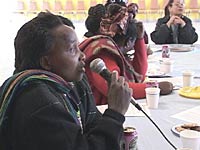
Anne: How are you getting your message out?
Regina Sanyu: When you are campaigning you should always stick to a real thing. You do not promise air. You promise only what you are able to do.
I do not want to diminish the importance of money, because money and campaigning is very important, but we should not see money as an obstacle so that people decide they cannot run for office because they do not have the money. There have been campaigns where the person with the most money did not win. Where people try to buy seats. I think it is important that we look at resources, more than just money. What resources are available to you when you get ready to run for office. As you pointed out, someone with a car to drive you where you have to go. Sometimes you can get marvelous volunteers who work with you in your campaign and your office for free. Who are there because they want you. You may not know the big contributors, but you may know people who are willing to help you raise some money, to hold coffees in their houses. You can have a cadre of volunteers that is very large, and sometimes we underestimate the power of our volunteers. They walk the precincts, knock on the doors, make the phone calls at night, who write letters to their friends, on and on and on.
When you first enter the campaign world you have no idea where the money is because, unless you are really into it, you do not even know the law firms that give most of the money. And their little coffees at their offices, little things like this that you are unaware of because you are not that professional politician and you have not been out there. But there is nothing like some great volunteers. They are a valuable resource when you are running for office.
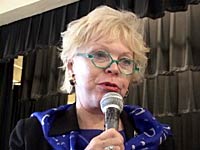
Anne: Susan Davis who ran for our kind of parliament had 2200 volunteers working for her. Can you imagine 2200 of us out there putting signs up, and posters. Making telephone calls. And it works.
That was the kind of campaign that I ran. It was based on volunteers. For the most part I think you are better served when you go out and ask people to vote for you. Don’t be afraid to say,”Vote for me.” And if they way “Why,” say, “Because I am the best and I am willing to serve you.” I am willing to do what it takes to get our issues or at least protect our women and to educate our children. Whatever it is that you really believe. Get our there and say “Vote for me” and say why. That is how you are going to get the votes. It is about money, but as Shirley said, the volunteers and one-on-one. Walking, talking and working, that is what gets it.
How do you get some free media?
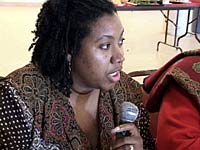
Hon. Miria Matembe: When you are incumbent, it may be much more difficult for you to win elections unless you are an incumbent that has performed to the expectations of the people. Then you win. If you do not perform, at the end you face a lot of problems. Media is important. But I do not know what they meant by free. It is not free. It can destroy you. Other people can buy it. I remember the last time I was running they would come there (I think they were paid by my opponent) and I would talk and answer questions, and the next day in the paper it would say “Matembe failed to answer questions from the floor.” That media was working against me, but it helped me because my supporters in Kampala, in the city center, said, “What has happened to this woman? She has never failed to answer questions.” They moved to where I was in the campaign. They mobilized money. They sent people to come and see what has happened to me. And of course, when they came they found I was doing very well. And they gave me money and support. But if other constituencies read the media and thought I was losing support in another constituency, they would ask, “Are we going to waste our votes?” Media can be so dangerous and for women, at least in Uganda, we have not yet learned how to use media to our advantage. A few women with money utilize it to their advantage, but most of us have not. After all, it is male dominated, it is always chauvinistic, and filled with negativity. So we have not yet broken through.
Anne: The media really helped Dee Dee Alpert and Susan Davis when the electricity problems (outages in California) surfaced. Those two women were right there I front of the cameras. They were going to solve the problem, and they were both elected. I am sure it was because they jumped right at that opportunity when the problem surfaced. They were right there with a solution.
The media is not free of course. However, in this country we do underestimate the power of the local newspapers. These newspapers are very eager to publish things. Those are the people who get out the grass roots people to vote. So you do not have to pay for that. You have to keep them informed. You can put your platform in. And from there the larger media will pick it up. That is the only free media in the United States. The small newspapers. But those can be used effectively, because most of the people who live in a neighborhood, they do take a look at it. So in looking at it they become acquainted with you and they become acquainted with what you stand for. If the message is clear, then from there they will come and be your volunteer.
I think a lot of people overlook the opportunities that can be found on the internet. There are a lot of sites that have specific interests. They are reaching a segment of the population. Now content starts off on the internet and ends up being published in a newspaper. It is a good opportunity to be able to put all your words in one place and have people be able to get access to it in a way they have not been able to in the past.
Anne: Here in San Diego we have cable television and public access. Community broadcasting. So we have used that. Now a lot of people do not watch public access, but if people are channel checking, they might all of a sudden see you and stop and say, “Oh, I know her and she it running for office.” And right before the election people who have these programs are always including candidates.
How do you run a campaign?
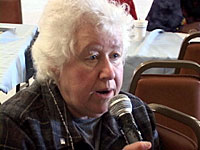
In a small district it is effective to go door to door and to speak with people one-on-one, but when district is 35,000 or more, this is no longer an effective way to try and reach voters.
Betty Aol Ocan : You should have these volunteers at different levels. If you are to run in a district, you need to target the counties, the sub-counties, parishes and the villages. And you need representations. You take posters and you have to organize rallies in all those areas. That is how people get to know what your message is, otherwise it is very difficult for them to know. We cannot go door-to-door because our constituency is large, it is very big. You need to get people who will be able to talk for you at all those levels and all those areas. And you have to facilitate them with the message and the basic transport for them to move. Like they pay for bicycles to let them move. Maybe their lunch. Those basic, basic requirements. That is how we should plan it if we are to succeed.
Solome Mukisa: What Betty is talking about is actually very very vital. I just want to stress that in those volunteers you are looking for, you must have focal points. After you have made your points and gone away, you must know that your opponent is coming to undo what you are saying. So there has to be somebody who is informed, with whom you get in touch all the time, so that when somebody comes, he is ready to talk on your behalf. The focal point is very important. You set the fire, but you must be sure that someone is there to make sure the fire is burning, until the election day. Otherwise it cannot work.
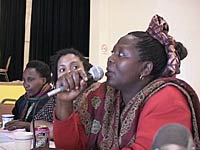
Jolly Mugisha: For Miria Matembe’s election we have been using the existing structures. Leadership that are in the country. So we use the existing structures, we contact with the leaders, and we have the focal point persons that Solome has said. What I have found important as we go through an election, one has got to move there physically as we have said. You must have transport at your disposal. You must have fuel. You must have money. You must have posters. The places are big and you have got to move there. You make a center that you all start from and then you spread out to the different areas. And you from the center have got to keep on going to the grass roots to find out what is happening and, indeed, undo what the opponent has planted.
Anne: Do we do any of that here, the type of building a web?
I think we do in some of the national or statewide campaigns. There are efforts to have surrogate speakers. You will get talking points from the campaign and be asked to go out and deliver a speech on behalf of a candidate. That is a strategy. It is sometimes difficult to control the message down the line. Sometimes the people who volunteer to be surrogates really want to be out there to intellectualize the issues so there can be a danger in that. But going back to the constitute groups. As a candidate, you have to show up everywhere. Tip O’Neil said, “All politics is local. The smaller the group, the higher the vote count.” If you go to talk to the DRA or whatever it is, those people show up. They are going to vote. And every person who shows up represents another 25 people, because they are going to talk. And every little organization – the gardeners of Rancho Bernardo – has a newsletter that says in it that you came to their group. Showing up. Being there, to the point of exhaustion. That is what the campaign is really about. It does not really matter so much the message, because people do not remember that. They just remember, oh I met this person. Or she talked to my group.
I think we do this also with phone banking. I did this in working with Elect Women for a Change Campaign. And you do deliver the message through the phones and volunteers delivering through phones. It is very common here in the states. But the follow up for that for it to be effective is to phone on election day and make sure that people either mailed in their ballot or are getting to the polls, and getting the transportation to get them to the polls. Once you have identified who is going to vote for you, you need to make sure they get there and have the transportation to get there.
Some of the things you are achieving by having local representatives are achieved in other ways here because of the access to telephones, transportation and so on. But here, the real sign of your support is the yard sign. This is your poster with your name on it sitting in the front yard. And we look to see the places where we have yard signs and where we do not have yard signs. It also says that is who you are really voting for, if you have their sign in your yard. People may say over the phone, “Yes, I am with you,” but maybe they are and maybe they are not. If they put a yard sign in their yard, that is your vote.
Lydia Rwakishaya: We in Uganda use all the opportunities that we can come up with. If you are in your church and can talk about your issues and ideas, you extend. If there is a funeral function, you do it. If you go to the market and you think you can talk and people will hear you, then you can extend the message. And weddings, and any other function that you go to. As long as there is a gathering and you can talk with people and they can listen, you can extend your message.
Let’s move on to fundraising.
Anne: How easy is it to ask somebody to contribute to your campaign?
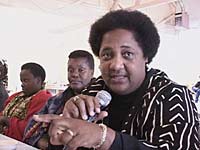
No matter how difficult it is, no matter how much you hate to do it, because usually you as a woman are more of a giver than a receiver, no matter how much you have to do it, you must, must, must, must overcome any reluctance you have. You have to stand up and say, “Please give me money. I cannot win without it. And don’t just give me a little a little bit, give me a lot. This is vital. If you have to tell yourself a thousand times a day, do it – that the money you are asking for is not for yourself. It is for the entity you are running for. For your schools, if you are running for the school board. It is for your country if you are running for congress or parliament. (applause)
Hon. Miria Matembe: What I have learned in my campaigns is that women are not supporters of women in terms of giving money. Even when they have it. Even women’s organiztions will say, “We are non-political, and if we support, then we need to support everybody.” This was an organization I founded and that I had been the chair of. And yet the rural women, they do not have the money to give you, but they will walk, they will go and look for votes for you. But my colleagues, it is men who give me (money.) In Uganda, women have not come out to support their fellow women at this higher level.
What is our message from this meeting?
Have a short three-point message and be able to answer yes or no.
We have money and resources – a winning combination.
You have to want to run for office. It is a very lonely experience and if you think it is a party and a bandwagon all the time, it is not.
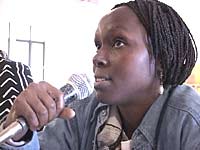
Lydia Bakaki: In Uganda, women would want to run for office, but when there would be no money, they would refuse to do any work saying, “We do not have money.” But what we did was to ask them, “Do you think it is important for women to stand for office? How would it be if there were no women standing? And we took them through a discussion about gender and the basics of running. After that discussion we found that there were many more women who were interested. In fact, to stand for even higher office – not just to stand, but to be effective. Because they saw that it was very important to the community that women stand. You need to weigh the difficulties of running for office against how important it is that a woman is there. It is worth trying. So maybe the work here needs to be harder in emphasizing the need.
We need to get in. If we do not have that representation, we have seen, that nobody else speaks for us.
Hon. Miria Matembe: Coupled with that, the challenge is to have women support women. No matter how committed you are, you reach a stage when you are really just exhausted. Where you are frustrated. When you are being attacked by the press right and left. They just keep quiet. They just do not come in. Unless women support women, then women will get out. They will simply get out.
The plan that I am going to use when I go home is local media. I am thinking about it right now. This is what all these rural people read.
It is extremely difficult for African American women to run for office. There is a strong male dominated presence in the African American community, dominated by African American ministers that are most unreceptive to women running for office. It is difficulty for these women, as a witness, to run for office. Often times they will support white males who run against African American females who run in African American communities. If you can imagine that in your wildest dreams. But I have found that older African American women are very supportive. And I have had great support from white women and white men in San Diego.
A Story: How Forum for Women in Democracy was Started
As told by Solome Mukisa Woman Political Activist, through Training, Advocacy and Networking, at National and Local Government Level
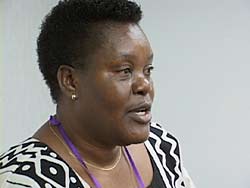
IN 1994, Uganda made a new constitution, and people were elected to make the delegation that made the constitution. And in this delegation there were 51 women and many of them came out of affirmative action, which required that each district would send a woman as part of the constitutional assembly. At that time we had 39 districts and some women did not contest at the district level to take advantage of the affirmative action. They went directly to compete with the men. And we got about 8 of them coming so we had 39 representative districts, 8 who contested directly with the men, and also we had workers represented, and along with the workers that came, there was a woman. And then there was a youth, and some others coming, making 51 women.
One thing that many women promised their constituencies when they were campaigning to be elected was that they wanted to bring articles that were gender sensitive. Articles that concern the lives of women. So when they finally got into the constitutional assembly, they had to insure that the constitution had a lot of articles supporting women.
Unfortunately, however, we realized there were only 51 women out of 270. And many of our men do not support these issues of women. So we realized that we are disadvantaged because of the numbers. So we had to raise a strategy to get many articles in the constitution. And one of the strategies we laid was to woo many men to support our issues. It was a very difficult strategy, but we went out of our way to talk to the men to support our issues.
We also said, that we would not just sit there, like the men would sit there because their numbers will make them get through any article they want. Because they are many. We said, “We must form a working committee. Which committee will plan for all the articles, will plan for all the issues on the floor, to be sure that the constitution is gender sensitive.
Among the 51 we elected 9 women, to lay the strategies for the Constitution to be gender sensitive. And that committee worked very hard, and I can assure you that today Uganda is said to be one of the countries that has the most gender sensitive constitution.
It is very very gender sensitive, even the language in the Constitution — we do not accept this business of saying, “He did this,” and then they say, “He stands for women.” We say no! You put he and she. He and she. Even the language itself is gender sensitive.
So when the constitution was made — it took about a year and a half — that was it, people had to go back to their homes. Women asked themselves, here we are, coming out with a gender sensitive constitution, but do the women know that they have a gender sensitive constitution? That was very important for us. Because for all these years, women have not known the importance of knowing about the constitution.
They do not know what is in the constitution for them. So we said, we must get out there and educate the women about the constitution.
And we said, “How will we do it? ” Everybody is now going back to their constituencies. So we said, “We must form a non-governmental organization, which will find funds and get out there into the whole country and educate women about the constitution.” And that is how FOWODE was born.
So our first program was just to go out there and teach women in Uganda about what is in the constitution for them.
Training
by Forum for Women in Democracy (FOWODE)
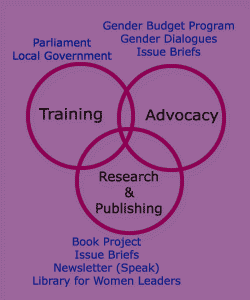
I would like to say, that just like here, we also have an NGO that is a network of all women’s non-governmental organizations in the country. It is called NAWOU – National Association of Women Organisations in Uganda http://www.nawou.org. That organization to which we are all members, FOWODE is a member of that organization. We actually call it an umbrella organization which coordinates all our activities.
FOWODE has three program areas. Our biggest program area is training. As I told you, when we were formed our main activity was to go out and teach women what was in the constitution for them, and also to educate them how to take advantage of their clause in the constitution. So that was our major component – training.
Now we have two components in the training program. We do training programs for members of parliament – women members of parliament. We also do programs for women members of local governments. Because women getting into politics is a new thing in the country, we are aware that some of them get there when they don’t even know what parliament is about or what government is about.
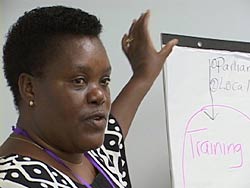
As soon as they are elected, we give them information on what parliament is about, and what local government is about. Just give information. So that they have that confidence about what they are doing.
As we are aware that women are getting into the game for the first time, we give them skills. We know that they are sitting with the men in that parliament or in the local council. The men have been at it for a long time, they have all the tricks. They know all about it. These women don’t know anything. So give them skills like, how you can effectively talk, how to raise issues in parliament or local government, and how to effectively present them.
And most important here is we educate members to form coalitions or caucuses so that we have a strong lobbying voice. Because this is about lobbying, isn’t it, and winning here and there for women, especially.
Now in these caucuses, we emphasize that numbers are very important. Numbers in lobbying are very important. So we tell them to pool with youth and other marginalized groups.
A Story: How Ugandan women formed Action for Development
As told by The Honorable Miria Matembe
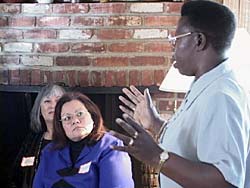
Now the women of Uganda, by 1985, having gone through all these terrible wars of destruction and suffering…the 1985 conference to mark the Women’s Decade…the women from Uganda were really very far from the issues of gender equality. They were isolated in the country because of the political instability and political atmosphere. They were only dealing with issues of welfare.
When in 1985, some Ugandan women went to Nairobi, they found that the atmosphere of women was very different. Women were so united in their own countries whereas for us we were so divided along political lines. Women out there were talking about issues of development, not welfare issues.
Now when those Ugandan women came back home in 1985, they called the sisters around and they said, “Look here, the spirit that we saw in Nairobi, among women, is very very different from what we are here. We need to get that spirit and embrace it.” That led to the birth of an organization called Action for Development.
The name is purposeful. We want to see action in the way of women’s development. I am from that organization. I am one of the co-founding members. And we had our motto, which still stands, and it is “Breaking through, Building up and Binding.” We wanted to break through the Barriers that kept women in bondage of slavery. Shake them off — the cultural barriers, the religious barriers, discrimination, the legal barriers, the economic barriers, we wanted to shake them and break them and then build the qualities that would bring women forward. Qualities of confidence, skills, and Action for Development did achieve that.
Now, according to our Constitution, we have affirmative action, and we must have one-third women councilors at our local councils. One-third must be women.
also see these companion pages:
